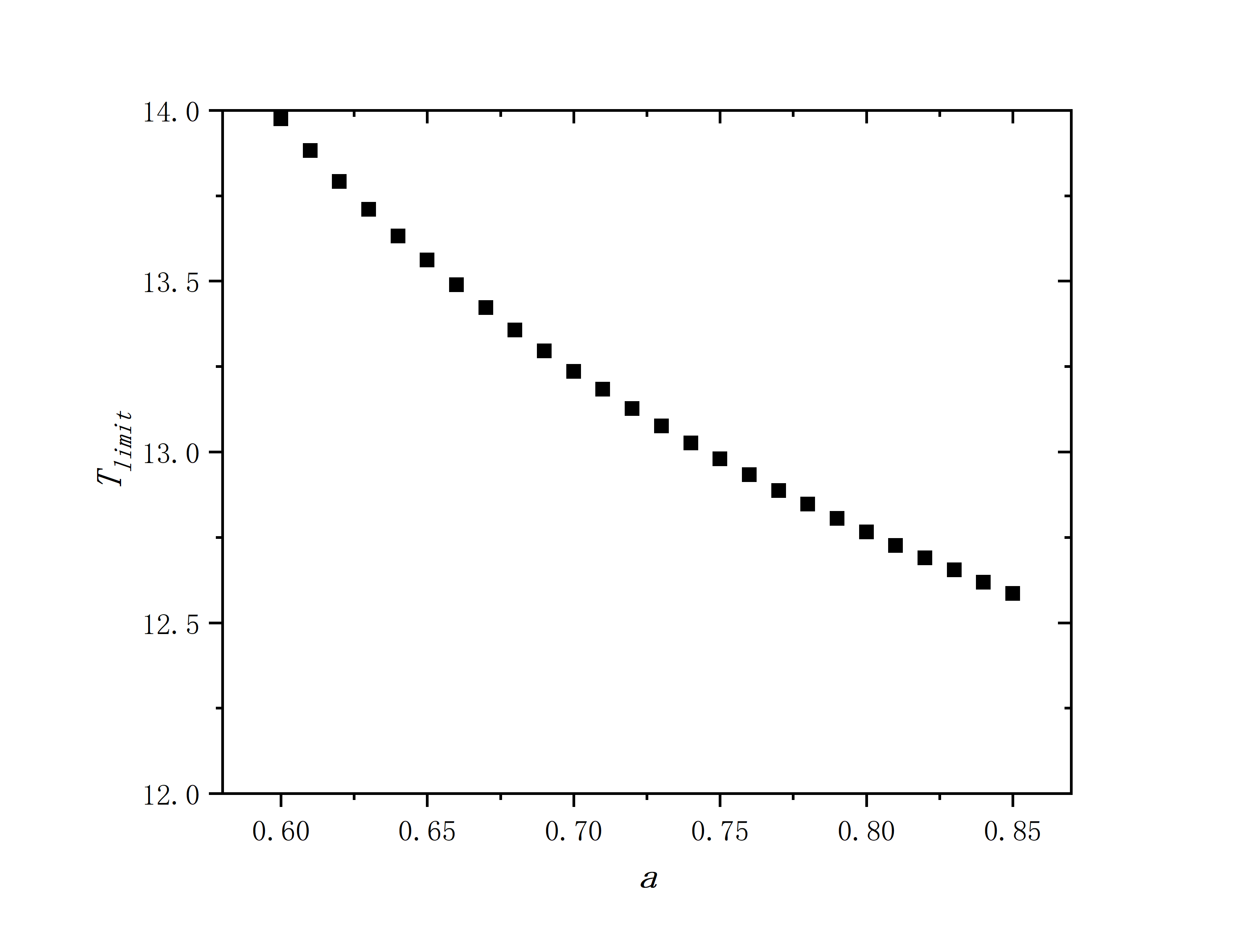New Burst-Oscillation Mode in Paced One-Dimensional Excitable Systems
阅读
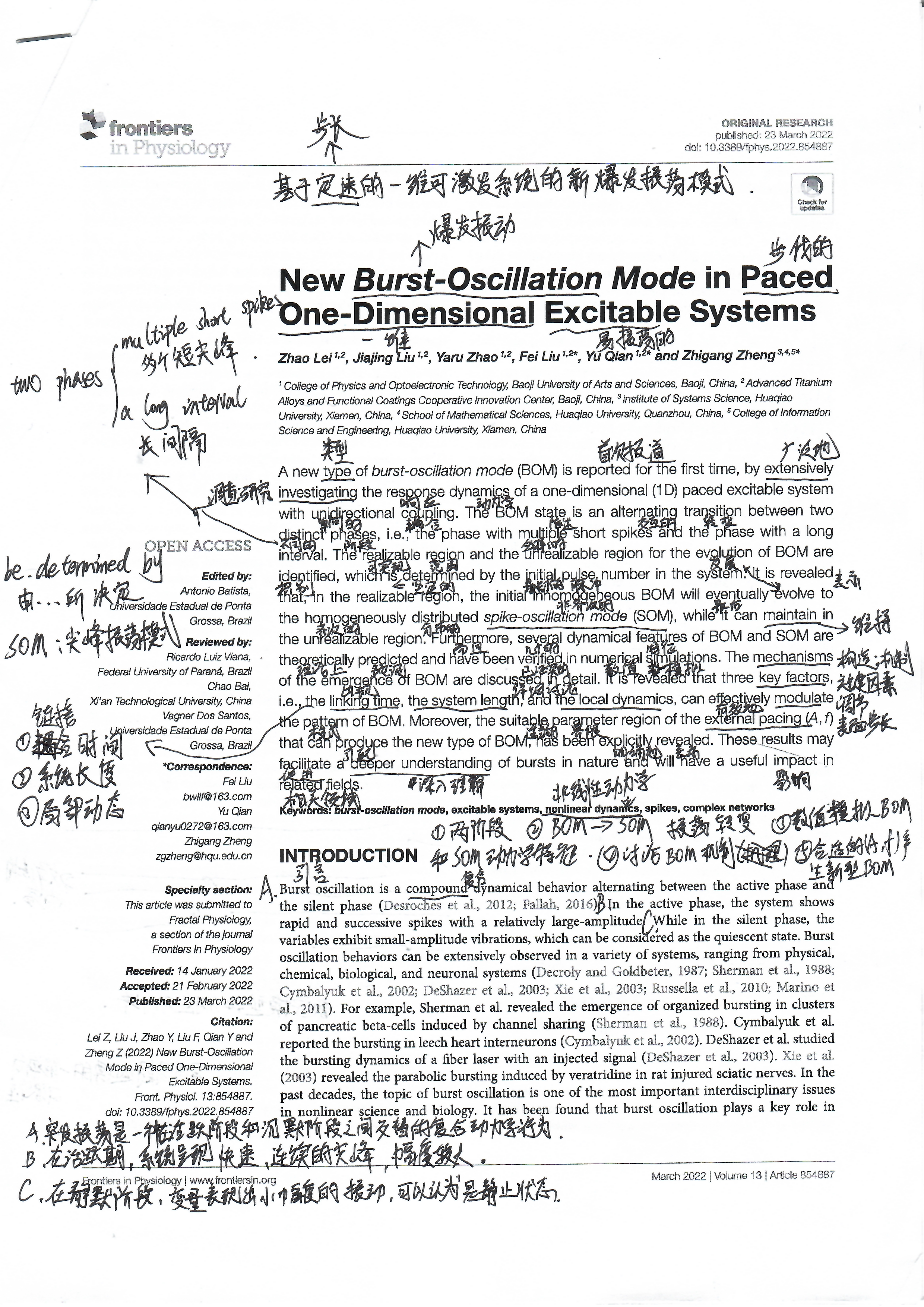
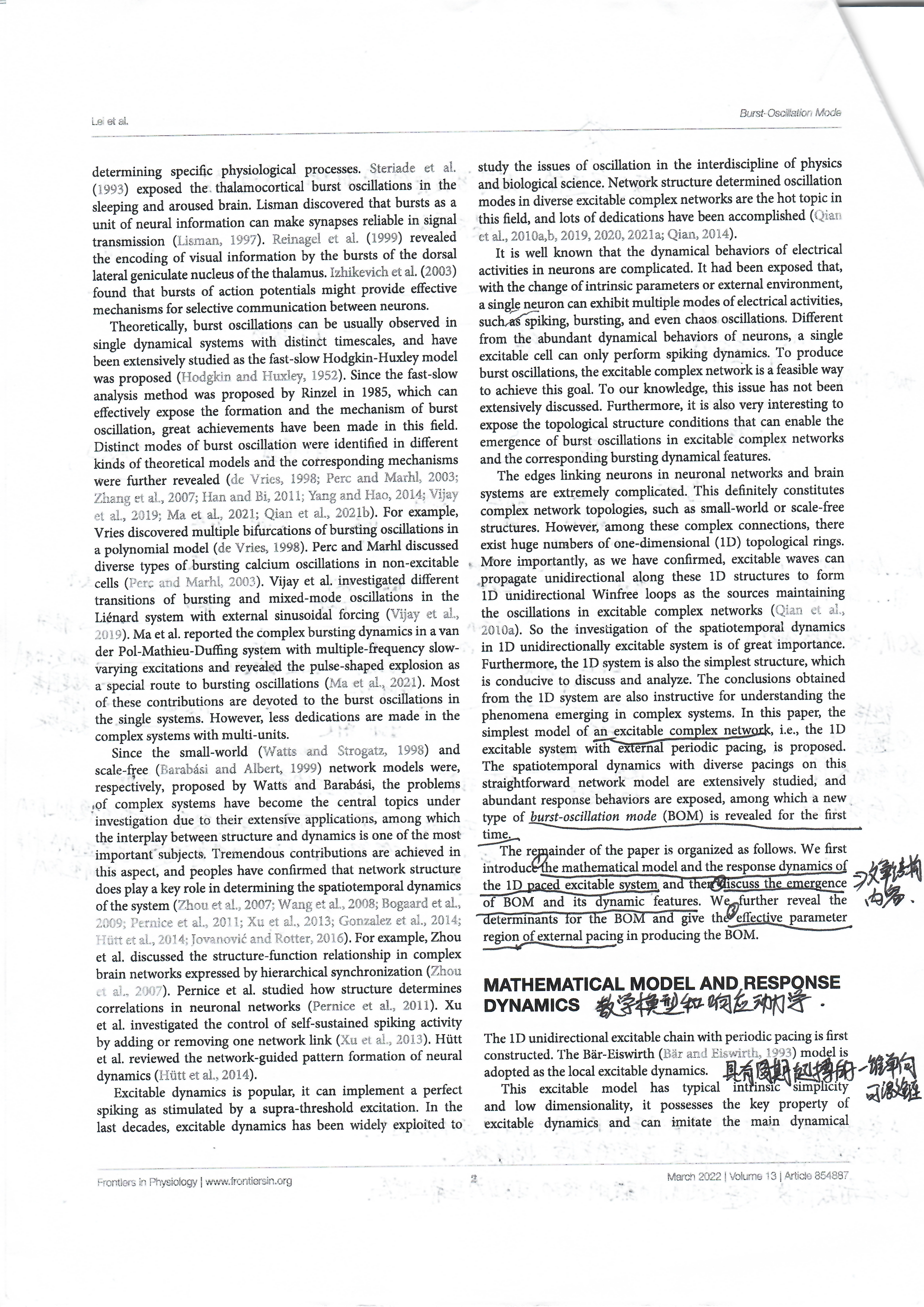
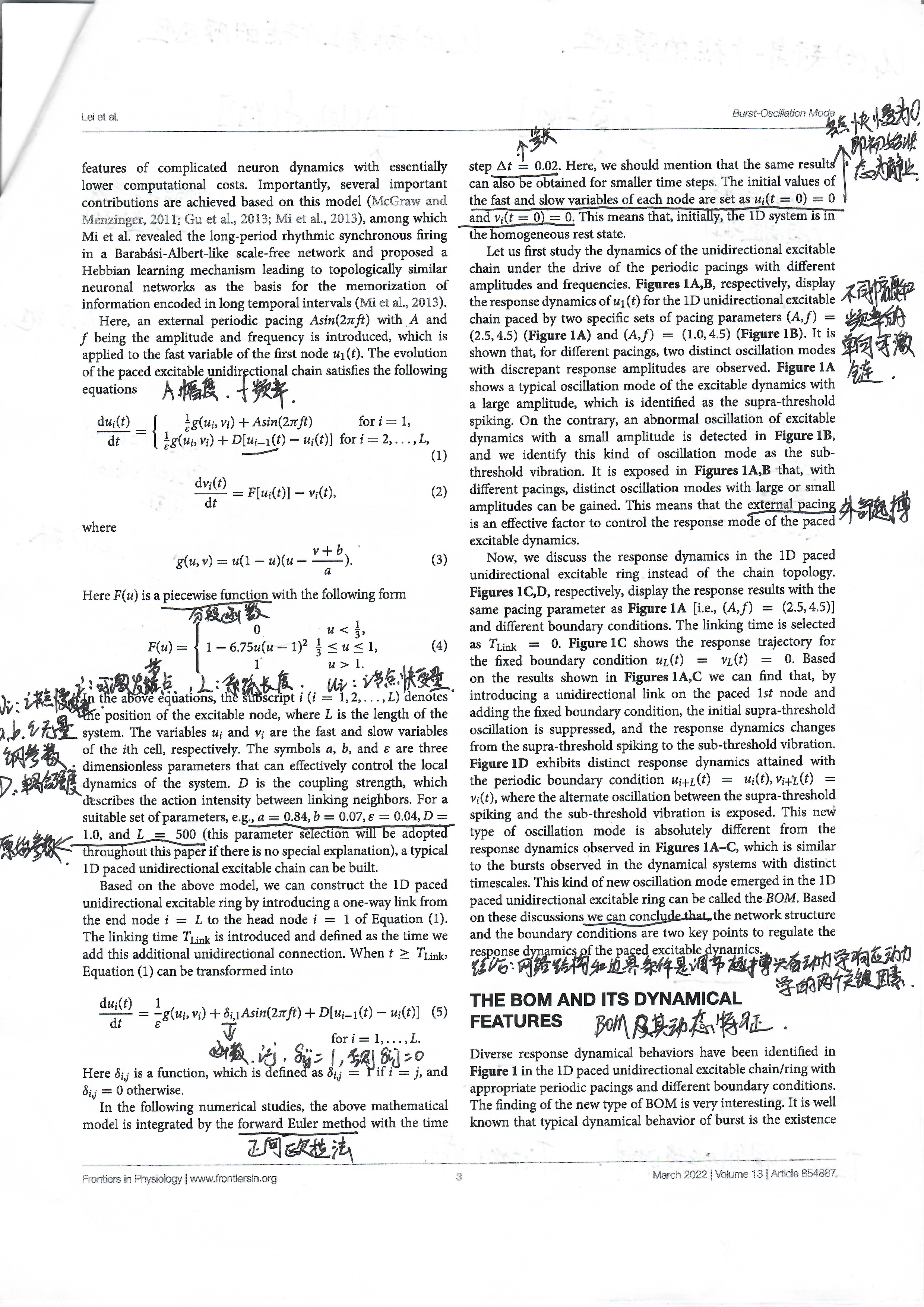
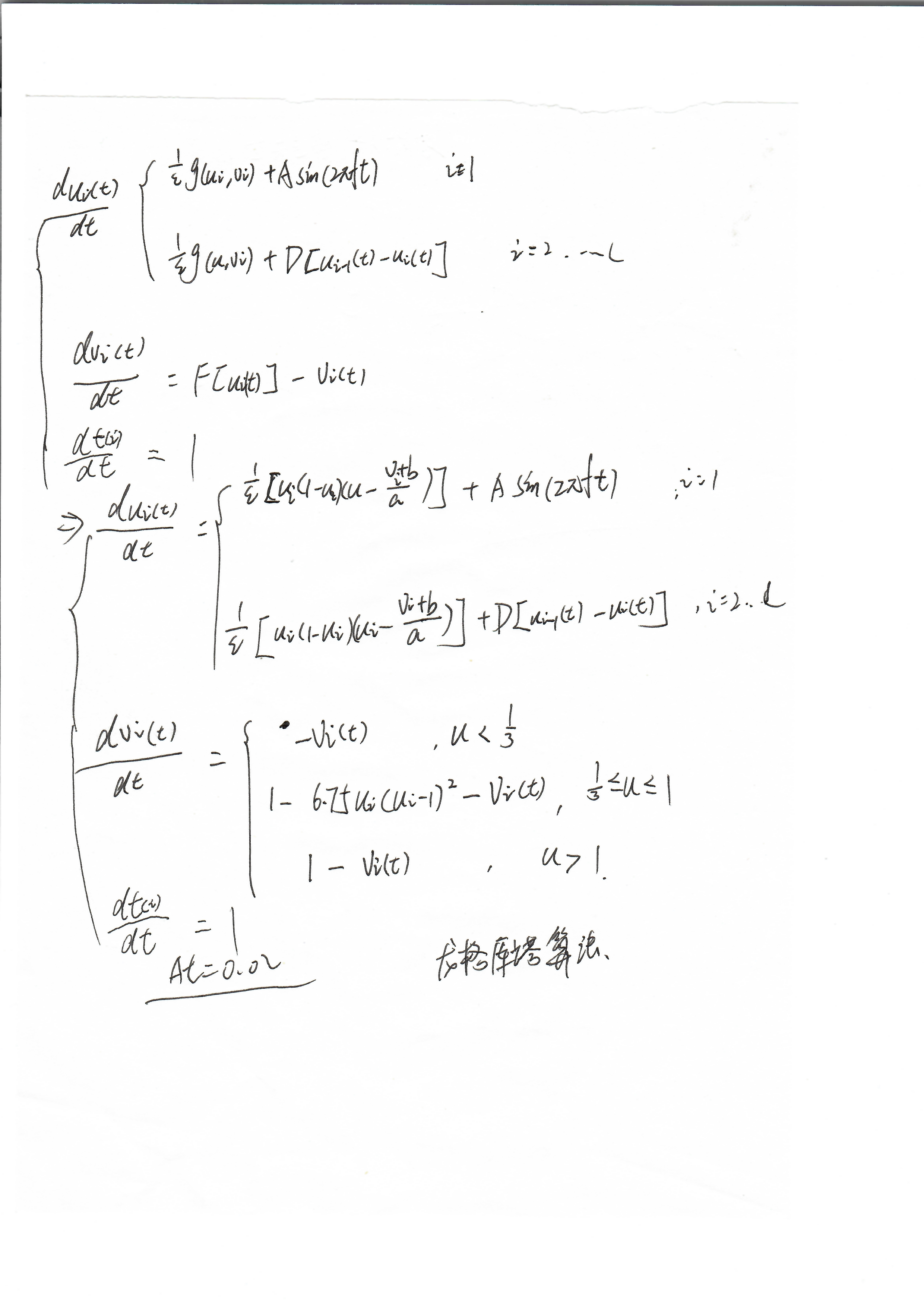
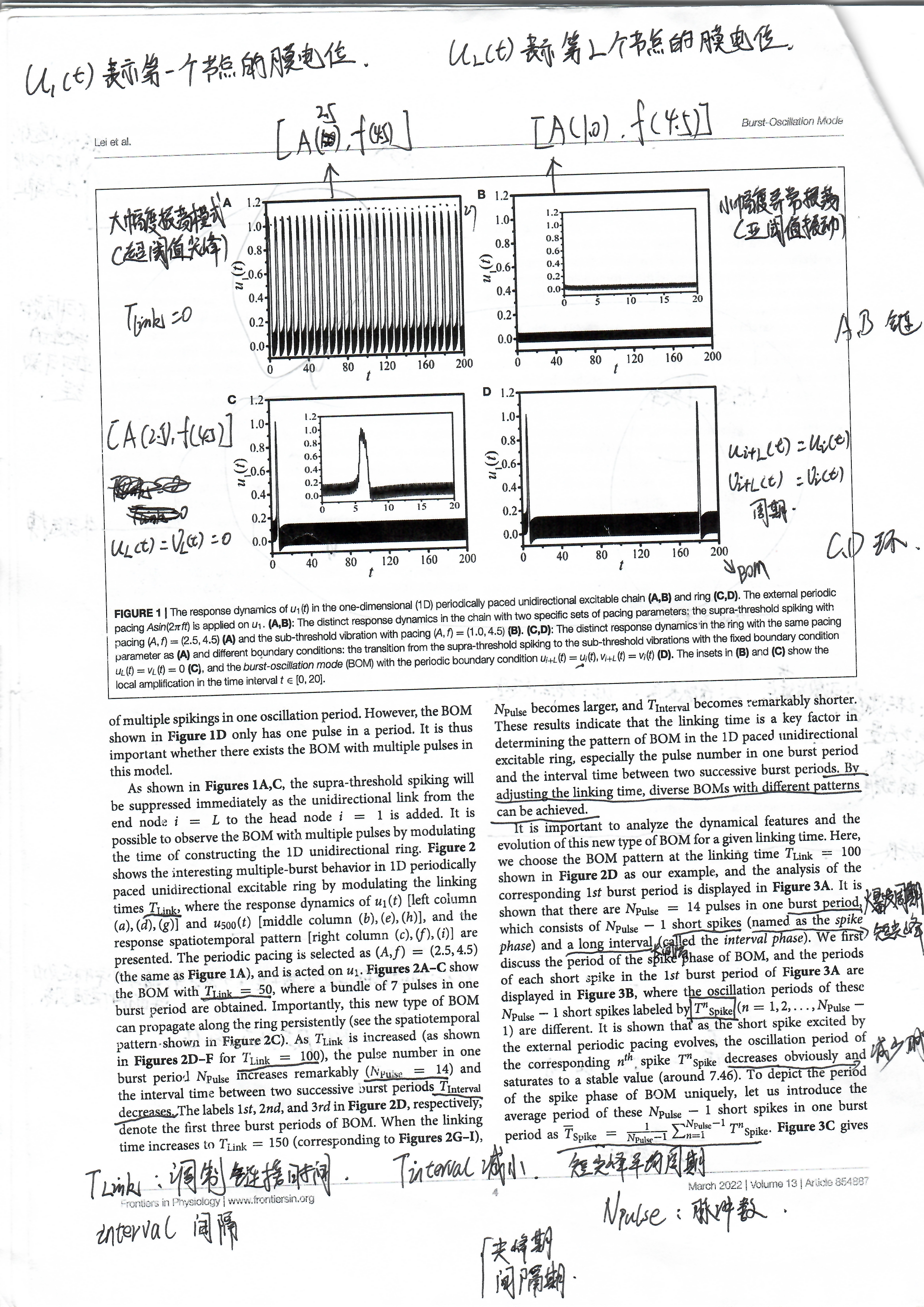
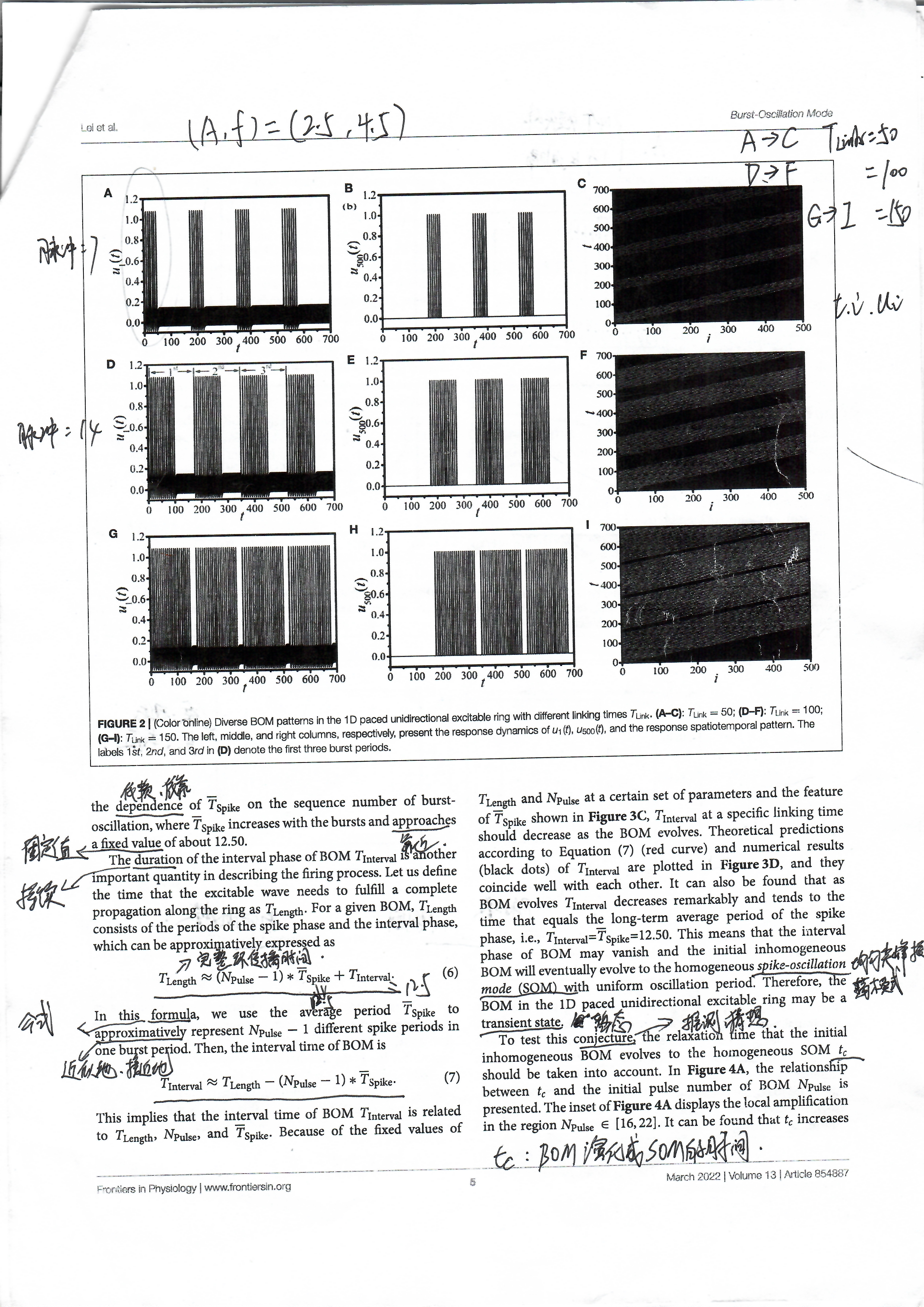
复现
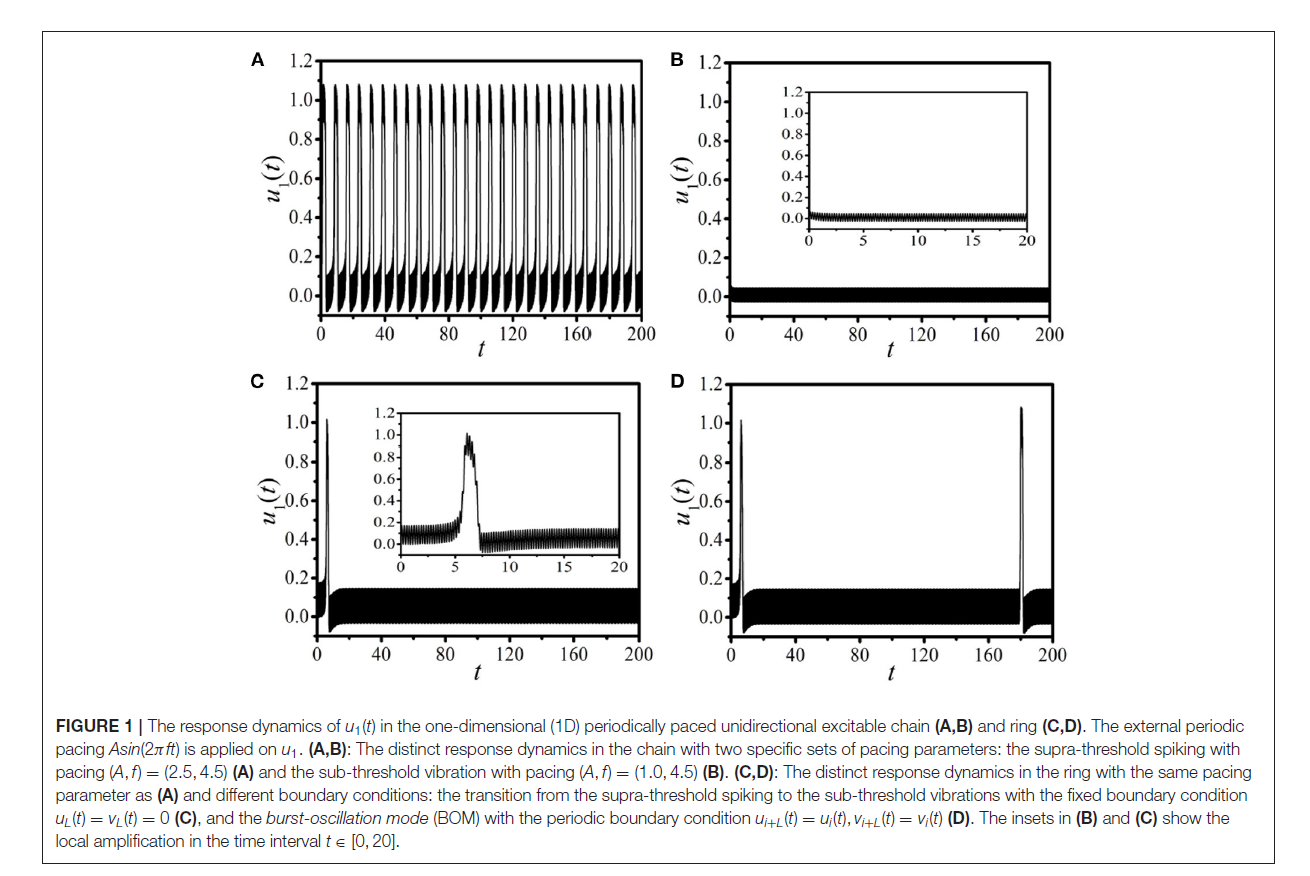
module BOM
implicit none
integer,parameter :: N=2,L=500,MaxT=10000
integer,allocatable :: chain_matrix(:,:)
real,parameter :: h=0.02,PI=3.1415926
contains
subroutine fnf(x,fx,n,i,j,t)
implicit none
real :: x(n,L),fx(n,L)
real :: epsilon=0.04,a=0.84,b=0.07,D=1.0,A1=2.5,f=4.5,effect
integer :: N,i,j,t,c
effect=0.0
do c=1,L,1
effect=effect+chain_matrix(i,c)*(x(1,j)-x(1,i))
end do
if(i==1) then
fx(1,i)=1.0/epsilon*(x(1,i)*(1-x(1,i))*(x(1,i)-(x(2,i)+b)/a))+A1*sin(2*PI*f*t*h)
else
fx(1,i)=1.0/epsilon*(x(1,i)*(1-x(1,i))*(x(1,i)-(x(2,i)+b)/a))+D*effect
end if
if(x(1,i)<1.0/3.0) then
fx(2,i)=-x(2,i)
elseif(x(1,i)>=1.0/3.0.and.x(1,i)<=1.0) then
fx(2,i)=1.0-6.75*x(1,i)*(x(1,i)-1)**2-x(2,i)
else
fx(2,i)=1-x(2,i)
end if
return
end subroutine fnf
subroutine rk4(N,h,x,i,j,t)
implicit none
integer :: N,i,j,t
real :: h,xx(N,L),x(N,L),fx(N,L)
real :: kx1(N,L),kx2(N,L),kx3(N,L),kx4(N,L)
xx=x
call fnf(xx,fx,N,i,j,t)
kx1=h*fx
xx=x+0.5*kx1
call fnf(xx,fx,N,i,j,t)
kx2=h*fx
xx=x+0.5*kx2
call fnf(xx,fx,N,i,j,t)
kx3=h*fx
xx=x+kx3
call fnf(xx,fx,N,i,j,t)
kx4=h*fx
x=x+(kx1+2.0*kx2+2.0*kx3+kx4)/6.0
return
end subroutine rk4
subroutine chain(node_number)
implicit none
integer :: node_number,a
allocate(chain_matrix(node_number,node_number))
chain_matrix=0
do a=2,node_number,1
chain_matrix(a,a-1)=1
end do
end subroutine chain
end module BOM
program main
use BOM
implicit none
integer :: i,j,t,b
real :: x(N,L)
x=0.0
call chain(L)
open(20,file="data_1.txt")
open(40,file="data_50.txt")
do t=1,MaxT,1
do i=1,L,1
if(i==1) then
call rk4(N,h,x(:,i),i,1,t)
write(20,*) t*h,x(1,i)
end if
do j=1,L,1
if(chain_matrix(i,j)==1) then
call rk4(N,h,x(:,i),i,j,t)
if(i==50) then
write(40,*) t*h,x(1,i)
end if
end if
end do
end do
end do
deallocate(chain_matrix)
end program main
module BOM
implicit none
integer,parameter :: N=2,L=500,MaxT=10000
integer,allocatable :: chain_matrix(:,:)
real,parameter :: h=0.02,PI=3.1415926
real :: preNode(L),x(N,L)
contains
subroutine fnf(x,fx,n,i,j,t)
implicit none
real :: x(N),fx(N)
real :: epsilon=0.04,a=0.84,b=0.07,D=1.0,A1=2.5,f=4.5,effect
integer :: N,i,j,t,c
effect=0.0
do c=1,L,1
effect=effect+chain_matrix(i,c)*(preNode(j)-x(1))
end do
if(i==1) then
fx(1)=1.0/epsilon*(x(1)*(1-x(1))*(x(1)-(x(2)+b)/a))+A1*sin(2*PI*f*t*h)
else
fx(1)=1.0/epsilon*(x(1)*(1-x(1))*(x(1)-(x(2)+b)/a))+D*effect
end if
if(x(1)<1.0/3.0) then
fx(2)=-x(2)
elseif(x(1)>=1.0/3.0.and.x(1)<=1.0) then
fx(2)=1.0-6.75*x(1)*(x(1)-1)**2-x(2)
else
fx(2)=1-x(2)
end if
return
end subroutine fnf
subroutine rk4(N,h,x,i,j,t)
implicit none
integer :: N,i,j,t,i1
real :: h,xx(N),fx(N),x(N)
real :: kx1(N),kx2(N),kx3(N),kx4(N)
xx=x
call fnf(xx,fx,N,i,j,t)
kx1=h*fx
xx=xx+0.5*kx1
call fnf(xx,fx,N,i,j,t)
kx2=h*fx
xx=xx+0.5*kx2
call fnf(xx,fx,N,i,j,t)
kx3=h*fx
xx=xx+kx3
call fnf(xx,fx,N,i,j,t)
kx4=h*fx
x=x+(kx1+2.0*kx2+2.0*kx3+kx4)/6.0
return
end subroutine rk4
subroutine chain(node_number)
implicit none
integer :: node_number,a
allocate(chain_matrix(node_number,node_number))
chain_matrix=0
do a=2,node_number,1
chain_matrix(a,a-1)=1
end do
end subroutine chain
end module BOM
program main
use BOM
implicit none
integer :: i,j,t,b
x=0.0
call chain(L)
open(20,file="data_1.txt")
open(40,file="data_50.txt")
do t=1,MaxT,1
preNode=0.0
do i=1,L,1
if(i==1) then
call rk4(N,h,x(:,i),i,1,t)
preNode(i)=x(1,i)
write(20,*) t*h,x(1,i)
end if
do j=1,L,1
if(chain_matrix(i,j)==1) then
call rk4(N,h,x(:,i),i,j,t)
preNode(i)=x(1,i)
if(i==50) then
write(40,*) t*h,x(1,i)
end if
end if
end do
end do
end do
deallocate(chain_matrix)
end program main
一阶欧拉法
- $f(x1)$=$f(x0)$+h*$f(x0)$
module BOM
implicit none
integer,parameter :: L=500,MaxT=10000
integer,allocatable :: chain_matrix(:,:)
real,parameter :: h=0.02,PI=3.1415926
contains
subroutine fnf()
implicit none
real :: epsilon=0.04,a=0.84,b=0.07,D=1.0,A1=2.5,f=4.5,effect,u(L),v(L),fun_u(L),fun_v(L)
integer :: i,j,t
u=0.0
v=0.0
do t=1,MaxT,1
do i=1,L,1
effect=0
do j=1,L
effect=effect+chain_matrix(i,j)*(u(j)-u(i))
end do
if(i==1) then
fun_u(i)=u(i)+h*(1.0/epsilon*u(i)*(1.0-u(i))*(u(i)-(v(i)+b)/a)+A1*sin(2.0*PI*f*t*h))
else
fun_u(i)=u(i)+h*(1.0/epsilon*u(i)*(1.0-u(i))*(u(i)-(v(i)+b)/a)+D*effect)
end if
if(u(i)<1.0/3.0)then
fun_v(i)=v(i)+h*(-v(i))
else if(u(i)>=1.0/3.0.and.u(i)<=1)then
fun_v(i)=v(i)+h*(1-6.75D0*u(i)*(u(i)-1)**2-v(i))
else if(u(i)>1.0)then
fun_v(i)=v(i)+h*(1-v(i))
end if
if(i==1) then
write(20,*)t*h,fun_u(i)
end if
if(i==50) then
write(40,*)t*h,fun_v(i)
end if
end do
u=fun_u
v=fun_v
end do
close(20)
close(40)
return
end subroutine fnf
subroutine chain(node_number)
implicit none
integer :: node_number,a
allocate(chain_matrix(node_number,node_number))
chain_matrix=0
do a=2,node_number,1
chain_matrix(a,a-1)=1
end do
end subroutine chain
end module BOM
program main
use BOM
implicit none
open(20,file="data_1.txt")
open(40,file="data_50.txt")
call chain(L)
call fnf
deallocate(chain_matrix)
end program main
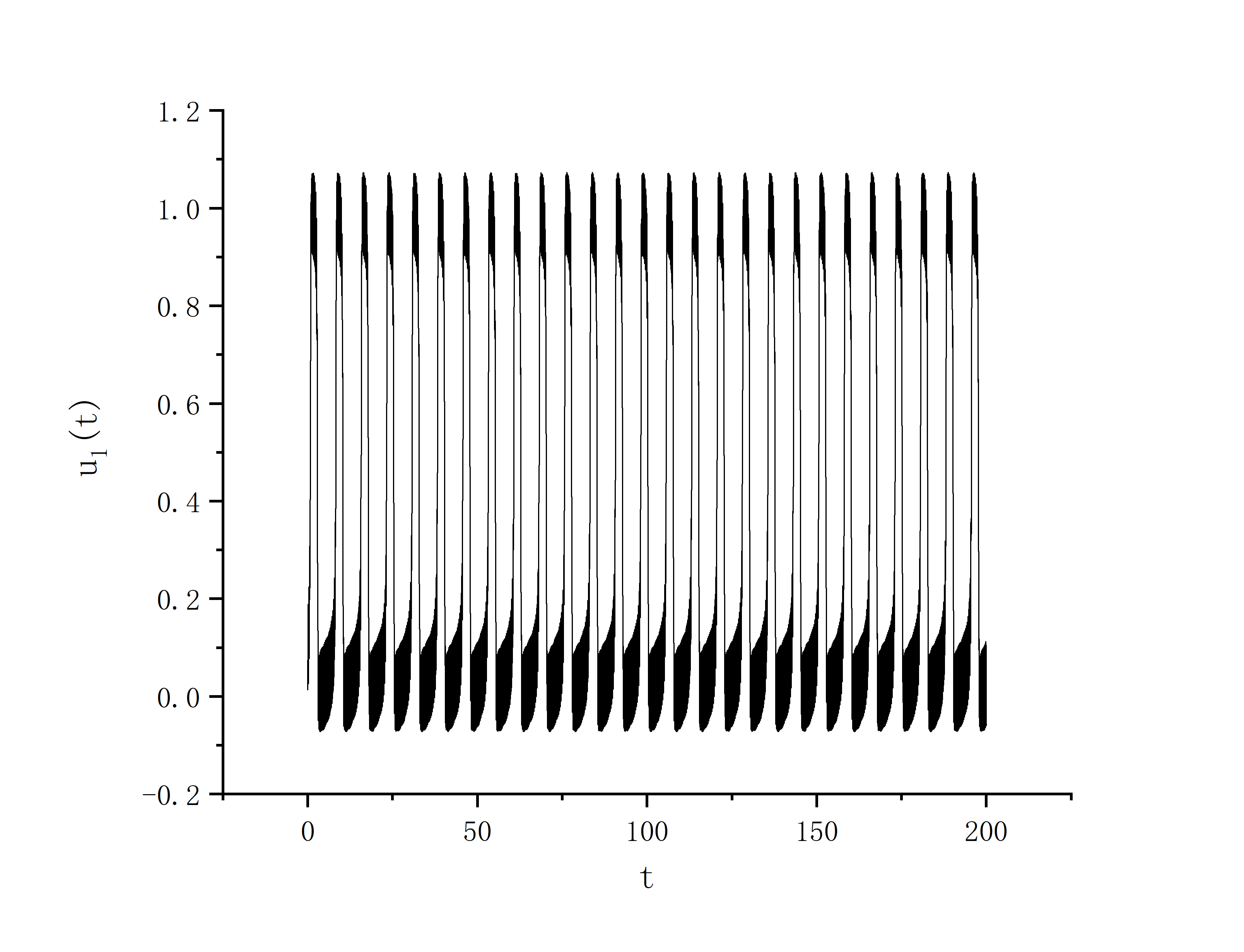
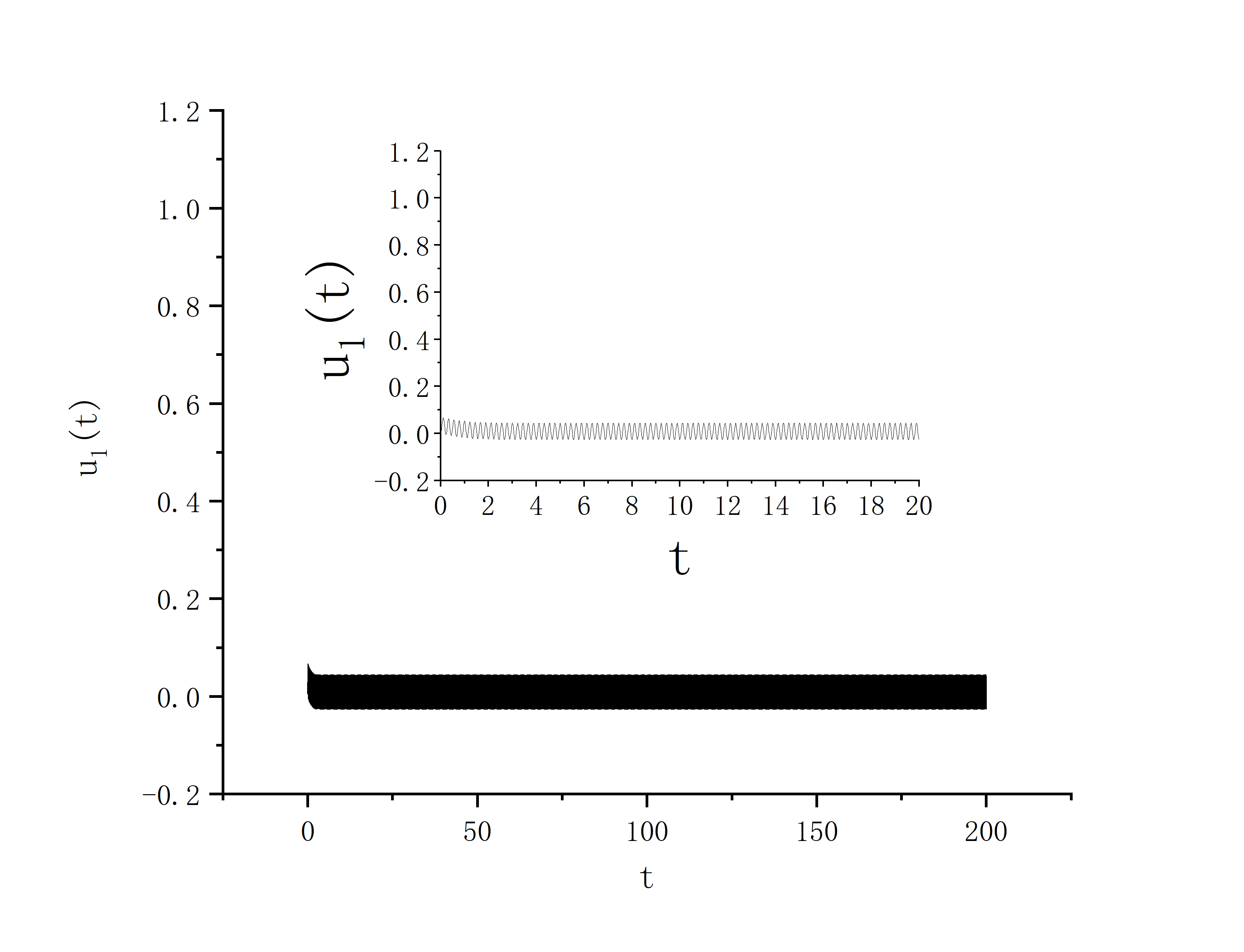
四阶龙格库塔法
module BOM
implicit none
integer,parameter :: N=3,L=500,MaxT=10000
real,parameter :: h=0.02,PI=3.1415926
integer,allocatable :: ring_matrix(:,:)
real :: preNode(L)
contains
subroutine fnf(x,fx,N,i,j)
implicit none
real :: x(N),fx(N)
real :: epsilon=0.04,a=0.84,b=0.07,D=1.0,A1=2.5,f=4.5,delta,ans
integer :: N,i,j
integer :: c
if(i==1) then
delta=1.0
else
delta=0.0
end if
ans=0.0
do c=1,L,1
ans=ans+ring_matrix(i,c)*(preNode(j)-x(1))
end do
fx(1)=1.0/epsilon*(x(1)*(1.0-x(1))*(x(1)-(x(2)+b)/a))+delta*A1*sin(2.0*PI*f*x(3))+D*ans
if(x(1)<1.0/3.0) then
fx(2)=-x(2)
elseif(x(1)>=1.0/3.0.and.x(1)<=1.0) then
fx(2)=1.0-6.75*x(1)*(x(1)-1.0)**2-x(2)
else
fx(2)=1.0-x(2)
end if
fx(3)=1.0
return
end subroutine fnf
subroutine rk4(N,x,i,j)
implicit none
integer :: i,j,N
real :: xx(N),x(N),fx(N)
real :: kx1(N),kx2(N),kx3(N),kx4(N)
xx=x
call fnf(xx,fx,N,i,j)
kx1=h*fx
xx=x+0.5*kx1
call fnf(xx,fx,N,i,j)
kx2=h*fx
xx=x+0.5*kx2
call fnf(xx,fx,N,i,j)
kx3=h*fx
xx=x+kx3
call fnf(xx,fx,N,i,j)
kx4=h*fx
x=x+(kx1+2.0*kx2+2.0*kx3+kx4)/6.0
return
end subroutine rk4
subroutine ring(node_number)
implicit none
integer :: node_number,a
allocate(ring_matrix(node_number,node_number))
ring_matrix=0
do a=2,node_number,1
ring_matrix(a,a-1)=1
end do
ring_matrix(1,node_number)=1
end subroutine ring
end module BOM
program main
use BOM
implicit none
integer :: i,j,t
real :: x(N,L)
call ring(L)
open(20,file="data.txt")
preNode=0.0
x=0.0
do t=1,MaxT,1
do i=1,L,1
do j=1,L,1
if(ring_matrix(i,j)==1) then
call rk4(N,x(:,i),i,j)
preNode(i)=x(1,i)
if(i==1) then
write(20,*) t*h,x(1,i),x(3,i)
end if
end if
end do
end do
preNode(L)=0.0
end do
deallocate(ring_matrix)
end program main
一阶欧拉法
module BOM
implicit none
integer,parameter :: L=500,MaxT=10000
integer,allocatable :: ring_matrix(:,:)
real,parameter :: h=0.02,PI=3.1415926
contains
subroutine fnf()
implicit none
real :: epsilon=0.04,a=0.84,b=0.07,D=1.0,A1=2.5,f=4.5,effect,u(L),v(L),fun_u(L),fun_v(L),delta
integer :: i,j,t
u=0.0
v=0.0
do t=1,MaxT,1
do i=1,L,1
effect=0.0
do j=1,L,1
effect=effect+ring_matrix(i,j)*(u(j)-u(i))
end do
if(i==1) then
delta=1.0
else
delta=0.0
end if
fun_u(i)=u(i)+h*(1.0/epsilon*(u(i)*(1.0-u(i))*(u(i)-(v(i)+b)/a))+delta*A1*sin(2*PI*f*t*h)+D*effect)
if(u(i)<1.0/3.0) then
fun_v(i)=v(i)+h*(-v(i))
else if(u(i)>=1.0/3.0.and.u(i)<=1) then
fun_v(i)=v(i)+h*(1-6.75*u(i)*(u(i)-1)**2-v(i))
else if(u(i)>1.0) then
fun_v(i)=v(i)+h*(1-v(i))
end if
if(i==1) then
write(20,*)t*h,fun_u(i)
end if
if(i==500) then
write(40,*)t*h,fun_v(i)
end if
end do
fun_u(L)=0.0
fun_v(L)=0.0
u=fun_u
v=fun_v
end do
close(20)
close(40)
return
end subroutine fnf
subroutine ring(node_number)
implicit none
integer :: node_number,a
allocate(ring_matrix(node_number,node_number))
ring_matrix=0
do a=2,node_number,1
ring_matrix(a,a-1)=1
end do
ring_matrix(1,node_number)=1
end subroutine ring
end module BOM
program main
use BOM
implicit none
open(20,file="data_1.txt")
open(40,file="data_50.txt")
call ring(L)
call fnf
deallocate(ring_matrix)
end program main
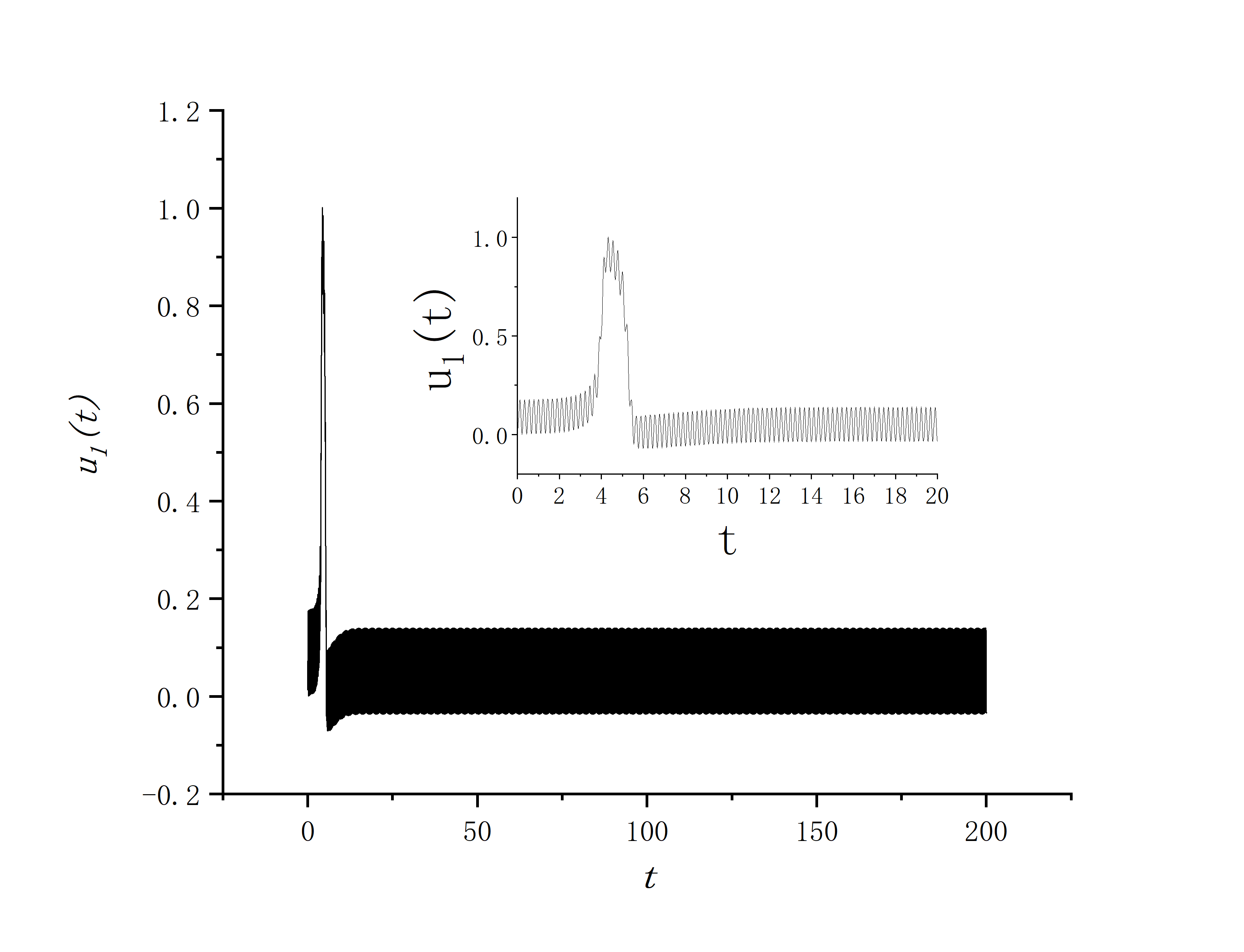
四阶龙格库塔法
module BOM
implicit none
integer,parameter :: N=3,L=500,MaxT=10000
real,parameter :: h=0.02,PI=3.1415926
integer,allocatable :: ring_matrix(:,:)
real :: preNode(L)
contains
subroutine fnf(x,fx,N,i,j)
implicit none
real :: x(N),fx(N)
real :: epsilon=0.04,a=0.84,b=0.07,D=1.0,A1=2.5,f=4.5,delta,ans
integer :: N,i,j
integer :: c
if(i==1) then
delta=1.0
else
delta=0.0
end if
ans=0.0
do c=1,L,1
ans=ans+ring_matrix(i,c)*(preNode(j)-x(1))
end do
fx(1)=1.0/epsilon*(x(1)*(1.0-x(1))*(x(1)-(x(2)+b)/a))+delta*A1*sin(2.0*PI*f*x(3))+D*ans
if(x(1)<1.0/3.0) then
fx(2)=-x(2)
elseif(x(1)>=1.0/3.0.and.x(1)<=1.0) then
fx(2)=1.0-6.75*x(1)*(x(1)-1.0)**2-x(2)
else
fx(2)=1.0-x(2)
end if
fx(3)=1.0
return
end subroutine fnf
subroutine rk4(N,x,i,j)
implicit none
integer :: i,j,N
real :: xx(N),x(N),fx(N)
real :: kx1(N),kx2(N),kx3(N),kx4(N)
xx=x
call fnf(xx,fx,N,i,j)
kx1=h*fx
xx=x+0.5*kx1
call fnf(xx,fx,N,i,j)
kx2=h*fx
xx=x+0.5*kx2
call fnf(xx,fx,N,i,j)
kx3=h*fx
xx=x+kx3
call fnf(xx,fx,N,i,j)
kx4=h*fx
x=x+(kx1+2.0*kx2+2.0*kx3+kx4)/6.0
return
end subroutine rk4
subroutine ring(node_number)
implicit none
integer :: node_number,a
allocate(ring_matrix(node_number,node_number))
ring_matrix=0
do a=2,node_number,1
ring_matrix(a,a-1)=1
end do
ring_matrix(1,node_number)=1
end subroutine ring
end module BOM
program main
use BOM
implicit none
integer :: i,j,t
real :: x(N,L)
call ring(L)
open(20,file="data.txt")
preNode=0.0
x=0.0
do t=1,MaxT,1
do i=1,L,1
do j=1,L,1
if(ring_matrix(i,j)==1) then
call rk4(N,x(:,i),i,j)
preNode(i)=x(1,i)
if(i==1) then
write(20,*) t*h,x(1,i),x(3,i)
end if
end if
end do
end do
end do
deallocate(ring_matrix)
end program main
- 思路,既然每个节点遍历相同的时间,可以不使用步长下遍历链或环,直接对每个 节点遍历相应时间,但这种方法可以很快看到节点趋势,时间数据庞大时可以使用,与实际走向相符,但这种方法适用较少传递节点低损失传播。
module BOM
implicit none
integer,parameter :: n=3,L=500
integer,allocatable :: ring_matrix(:,:)
integer :: i,j
real :: preNode(10000)
contains
subroutine ring(L)
implicit none
integer :: L,i
allocate(ring_matrix(L,L))
ring_matrix=0
do i=1,L-1,1
ring_matrix(i,i+1)=1
end do
ring_matrix(L,1)=1
deallocate(ring_matrix)
end subroutine ring
subroutine fnf(x,fx,n,i,j)
implicit none
real :: x(n),fx(n),epsilon=0.04,a=0.84,b=0.07,D=1.0,A1=2.5,f=4.5,delta
integer :: n,i,j
real,parameter :: PI=3.1415926
if(mod(i,500)==1) then
delta=1.0
else
delta=0.0
end if
fx(1)=1.0/epsilon*(x(1)*(1-x(1))*(x(1)-(x(2)+b)/a))+delta*A1*sin(2*PI*f*x(3))+D*(preNode(j)-x(1))
if(x(1)<1.0/3.0) then
fx(2)=-x(2)
elseif(x(1)>=1.0/3.0.and.x(1)<=1.0) then
fx(2)=1.0-6.75*x(1)*(x(1)-1)**2-x(2)
else
fx(2)=1-x(2)
end if
fx(3)=1
return
end subroutine fnf
subroutine rk4(n,h,x,i,j)
implicit none
integer :: n,i,j
real :: h,xx(n),x(n),fx(n)
real :: kx1(n),kx2(n),kx3(n),kx4(n)
xx=x
call fnf(xx,fx,n,i,j)
kx1=h*fx
xx=x+0.5*kx1
call fnf(xx,fx,n,i,j)
kx2=h*fx
xx=x+0.5*kx2
call fnf(xx,fx,n,i,j)
kx3=h*fx
xx=x+kx3
call fnf(xx,fx,n,i,j)
kx4=h*fx
x=x+(kx1+2.0*kx2+2.0*kx3+kx4)/6.0
return
end subroutine rk4
end module BOM
program main
use BOM
implicit none
real :: x(n),h=0.02
call ring(L)
x(1)=0.0
x(2)=0.0
preNode=0.0
open(20,file="data.txt")
do i=1,L+1,1
x(3)=0.0
do j=1,10000,1
call rk4(n,h,x,i,j)
preNode(j)=x(1)
if(i==501) then
write(20,*) x
end if
end do
end do
return
end program main
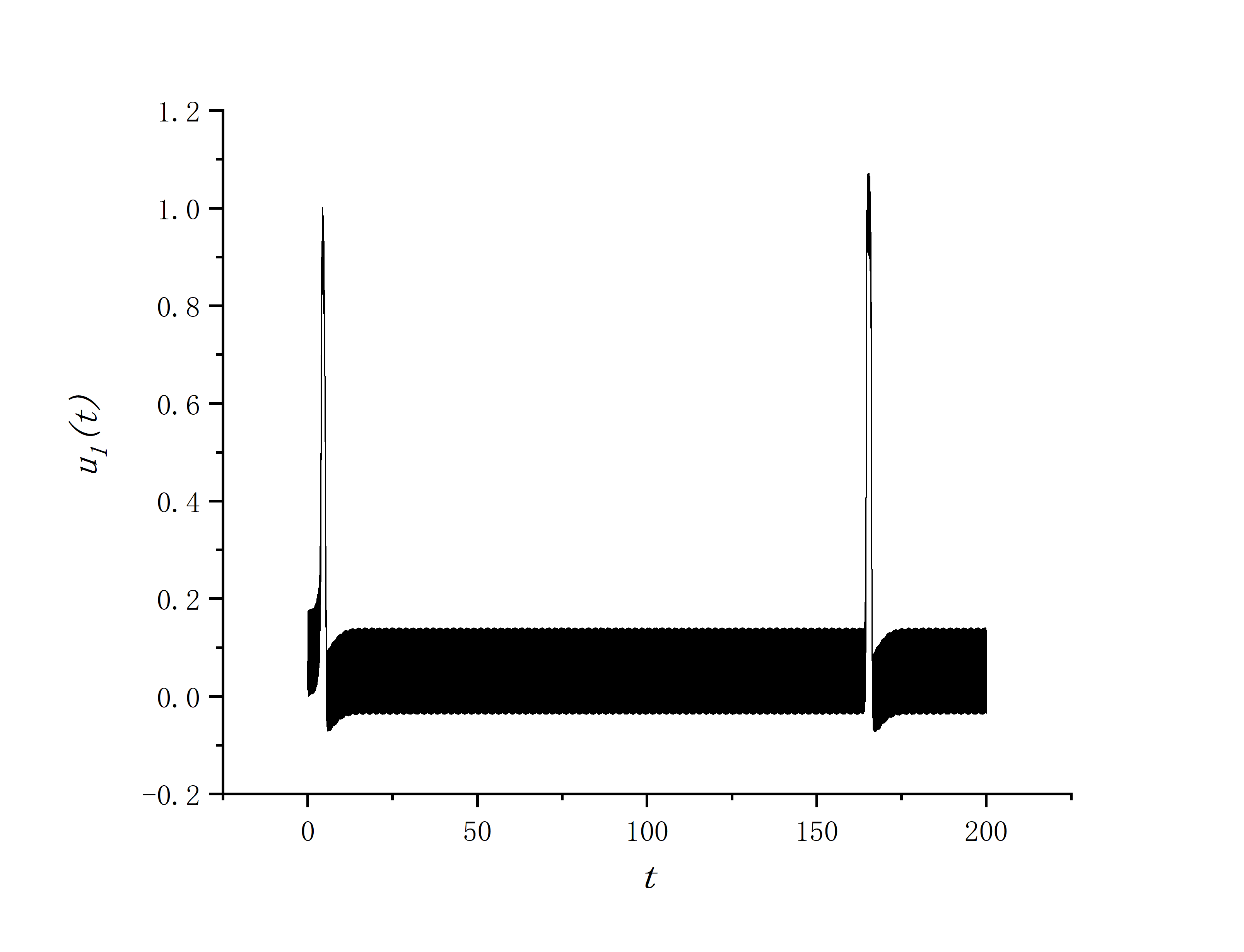
一阶欧拉法
module BOM
implicit none
integer,parameter :: L=500,MaxT=10000
integer,allocatable :: ring_matrix(:,:)
real,parameter :: h=0.02,PI=3.1415926
contains
subroutine fnf()
implicit none
real :: epsilon=0.04,a=0.84,b=0.07,D=1.0,A1=2.5,f=4.5,effect,u(L),v(L),fun_u(L),fun_v(L),delta
integer :: i,j,t
u=0.0
v=0.0
do t=1,MaxT,1
do i=1,L,1
effect=0.0
do j=1,L,1
effect=effect+ring_matrix(i,j)*(u(j)-u(i))
end do
if(i==1) then
delta=1.0
else
delta=0.0
end if
fun_u(i)=u(i)+h*(1.0/epsilon*(u(i)*(1.0-u(i))*(u(i)-(v(i)+b)/a))+delta*A1*sin(2*PI*f*t*h)+D*effect)
if(u(i)<1.0/3.0) then
fun_v(i)=v(i)+h*(-v(i))
else if(u(i)>=1.0/3.0.and.u(i)<=1) then
fun_v(i)=v(i)+h*(1-6.75*u(i)*(u(i)-1)**2-v(i))
else if(u(i)>1.0) then
fun_v(i)=v(i)+h*(1-v(i))
end if
if(i==1) then
write(20,*)t*h,fun_u(i)
end if
if(i==500) then
write(40,*)t*h,fun_v(i)
end if
end do
u=fun_u
v=fun_v
end do
close(20)
close(40)
return
end subroutine fnf
subroutine ring(node_number)
implicit none
integer :: node_number,a
allocate(ring_matrix(node_number,node_number))
ring_matrix=0
do a=2,node_number,1
ring_matrix(a,a-1)=1
end do
ring_matrix(1,node_number)=1
end subroutine ring
end module BOM
program main
use BOM
implicit none
open(20,file="data_1.txt")
open(40,file="data_50.txt")
call ring(L)
call fnf
deallocate(ring_matrix)
end program main
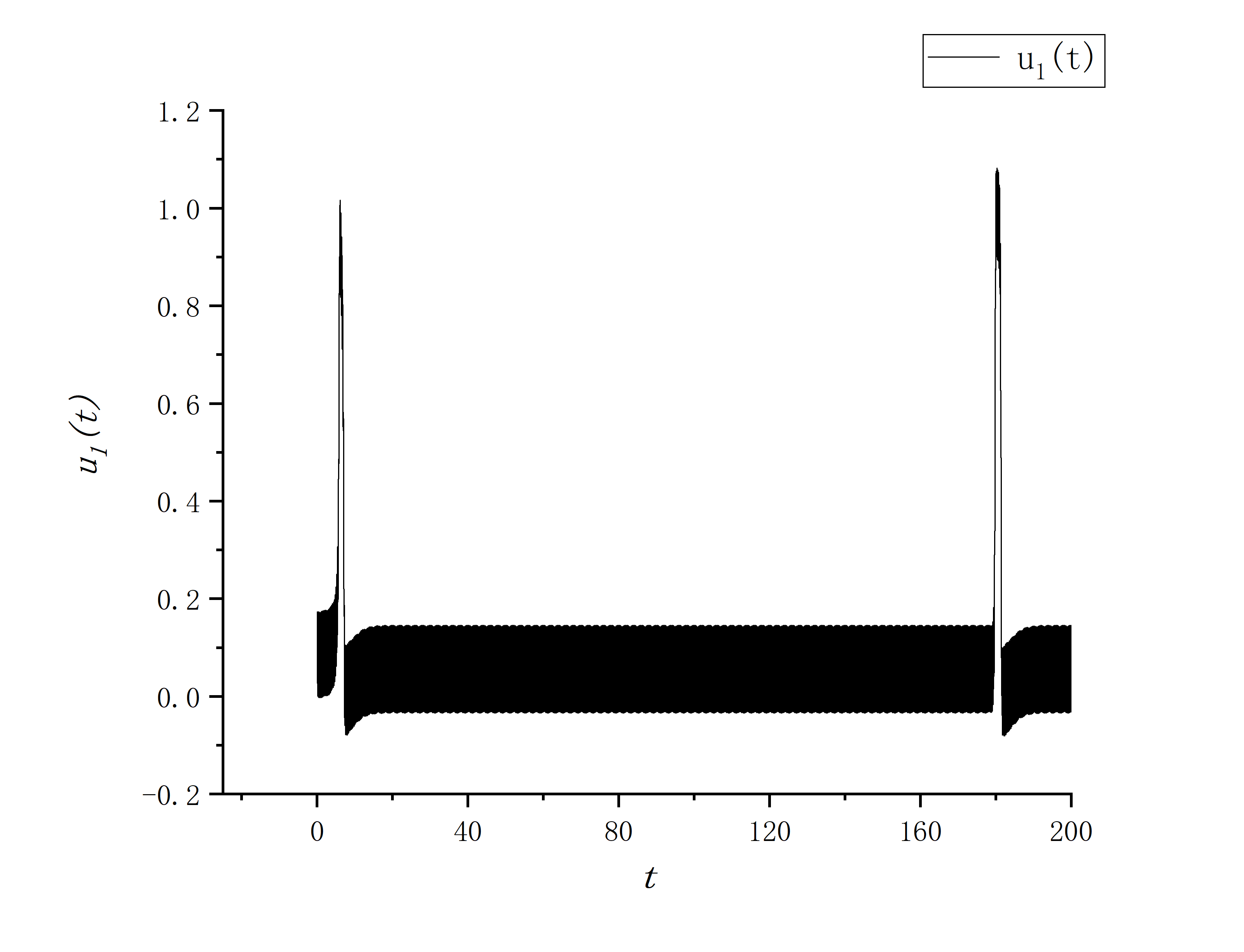
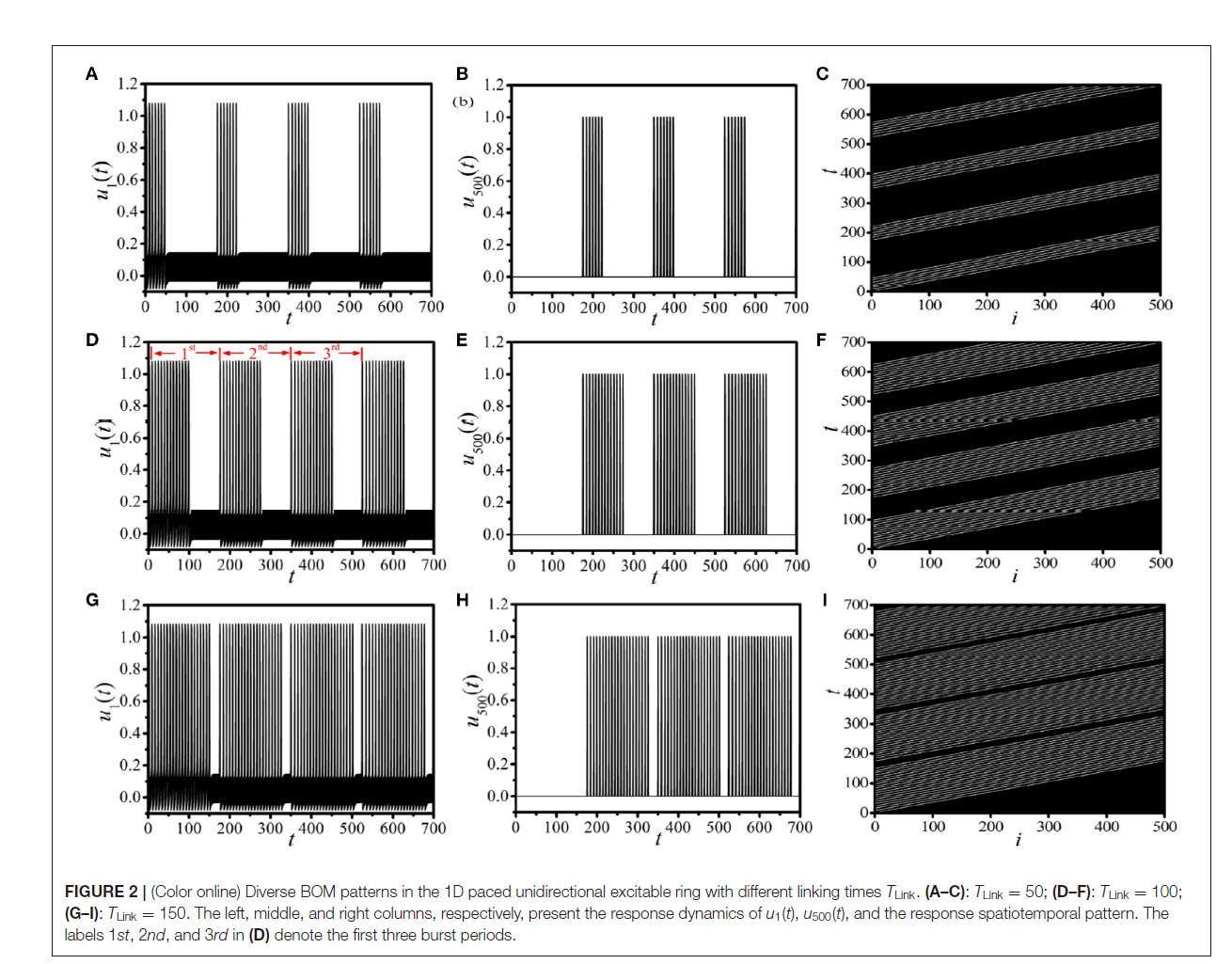
module BOM
implicit none
integer,parameter :: n=3,L=500
integer :: i,j
real :: preNode(35000)
contains
subroutine fnf(x,fx,n,i,j)
implicit none
real :: x(n),fx(n),epsilon=0.04,a=0.84,b=0.07,D=1.0,A1=2.5,f=4.5,delta
integer :: n,i,j
real,parameter :: PI=3.1415926
if(i==1.and.x(3)<=50.0) then
fx(1)=1.0/epsilon*(x(1)*(1-x(1))*(x(1)-(x(2)+b)/a))+A1*sin(2*PI*f*x(3))
else
if(mod(i,500)==1) then
delta=1.0
else
delta=0.0
end if
fx(1)=1.0/epsilon*(x(1)*(1-x(1))*(x(1)-(x(2)+b)/a))+delta*A1*sin(2*PI*f*x(3))+D*(preNode(j)-x(1))
end if
if(x(1)<1.0/3.0) then
fx(2)=-x(2)
elseif(x(1)>=1.0/3.0.and.x(1)<=1.0) then
fx(2)=1.0-6.75*x(1)*(x(1)-1)**2-x(2)
else
fx(2)=1-x(2)
end if
fx(3)=1
return
end subroutine fnf
subroutine rk4(n,h,x,i,j)
implicit none
integer :: n,i,j
real :: h,xx(n),x(n),fx(n)
real :: kx1(n),kx2(n),kx3(n),kx4(n)
xx=x
call fnf(xx,fx,n,i,j)
kx1=h*fx
xx=x+0.5*kx1
call fnf(xx,fx,n,i,j)
kx2=h*fx
xx=x+0.5*kx2
call fnf(xx,fx,n,i,j)
kx3=h*fx
xx=x+kx3
call fnf(xx,fx,n,i,j)
kx4=h*fx
x=x+(kx1+2.0*kx2+2.0*kx3+kx4)/6.0
return
end subroutine rk4
end module BOM
program main
use BOM
implicit none
real :: x(n),h=0.02
x(1)=0.0
x(2)=0.0
preNode=0.0
open(20,file="data.txt")
do i=1,3*L+1,1
x(3)=0.0
do j=1,35000,1
call rk4(n,h,x,i,j)
preNode(j)=x(1)
if(i==1) then
write(20,*) x
end if
end do
end do
end program main
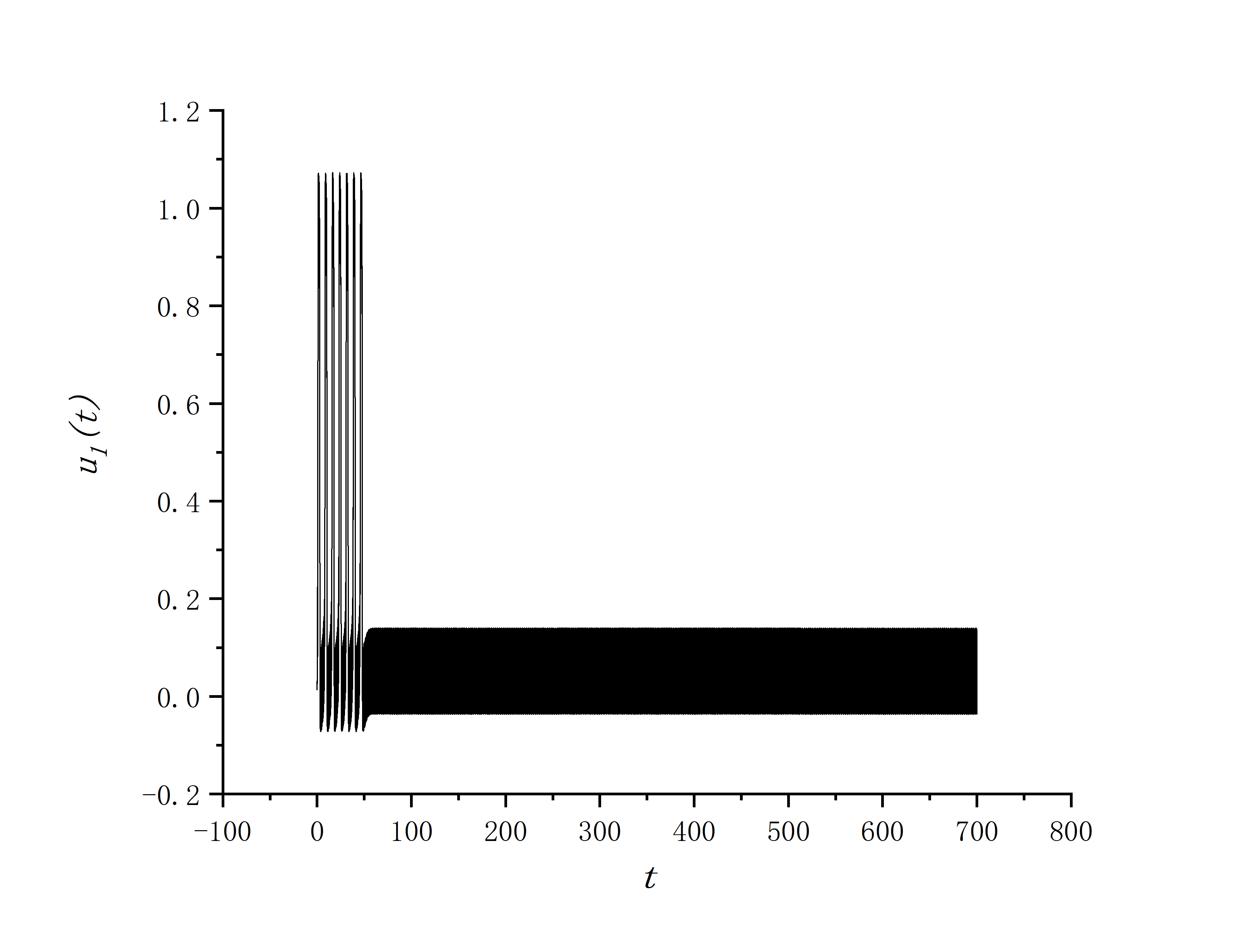
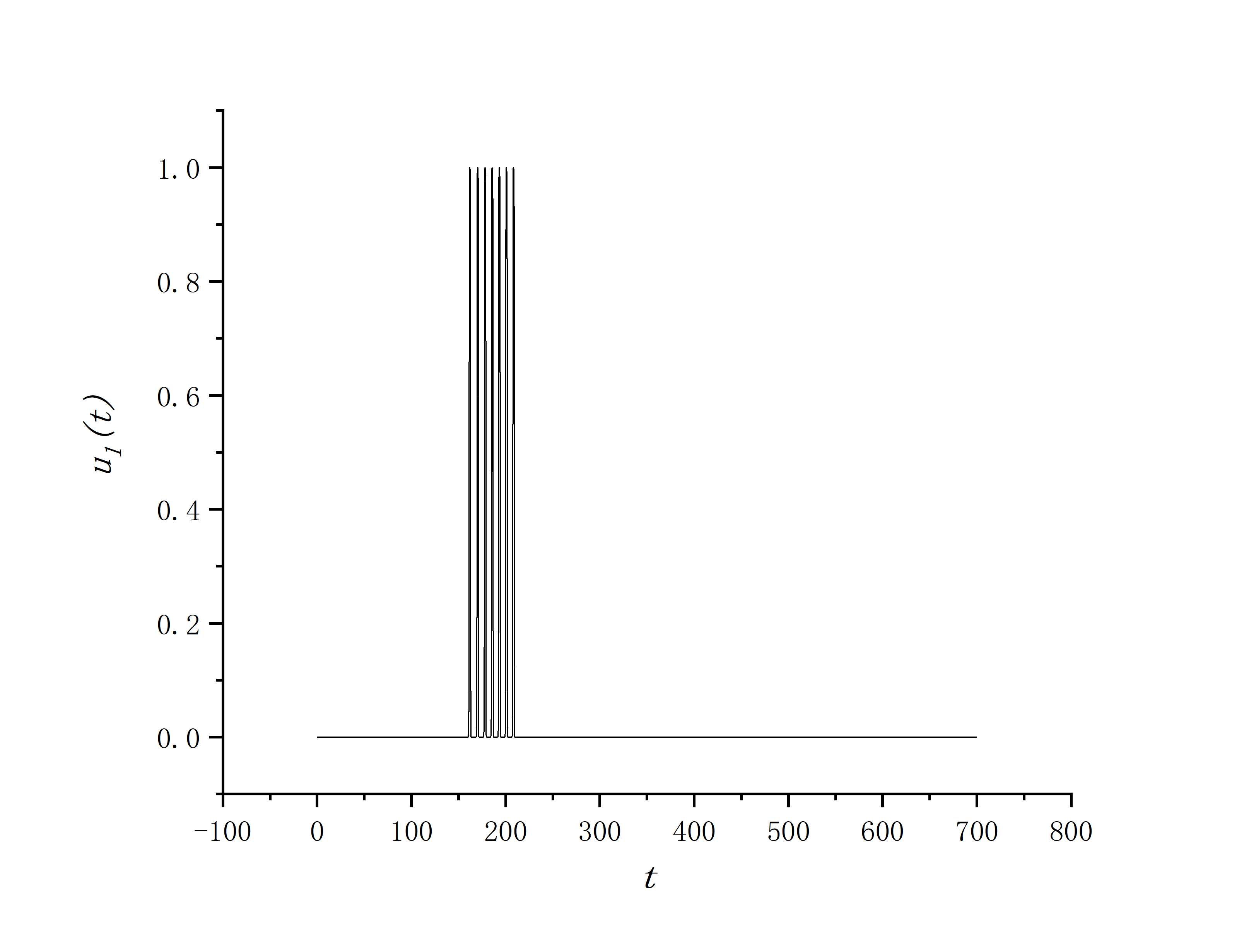
四阶龙格库塔法
module BOM
implicit none
integer,parameter :: N=3,L=500,MaxT=10000
real,parameter :: h=0.02,PI=3.1415926
integer,allocatable :: ring_matrix(:,:)
real :: preNode(L)
contains
subroutine fnf(x,fx,N,i,j)
implicit none
real :: x(N),fx(N)
real :: epsilon=0.04,a=0.84,b=0.07,D=1.0,A1=2.5,f=4.5,delta,ans
integer :: N,i,j
integer :: c
if(i==1) then
delta=1.0
else
delta=0.0
end if
ans=0.0
do c=1,L,1
ans=ans+ring_matrix(i,c)*(preNode(j)-x(1))
end do
if(x(3)<=50.and.i==1) then
fx(1)=1.0/epsilon*(x(1)*(1.0-x(1))*(x(1)-(x(2)+b)/a))+A1*sin(2.0*PI*f*x(3))
else
fx(1)=1.0/epsilon*(x(1)*(1.0-x(1))*(x(1)-(x(2)+b)/a))+delta*A1*sin(2.0*PI*f*x(3))+D*ans
end if
if(x(1)<1.0/3.0) then
fx(2)=-x(2)
elseif(x(1)>=1.0/3.0.and.x(1)<=1.0) then
fx(2)=1.0-6.75*x(1)*(x(1)-1.0)**2-x(2)
else
fx(2)=1.0-x(2)
end if
fx(3)=1.0
return
end subroutine fnf
subroutine rk4(N,x,i,j)
implicit none
integer :: i,j,N
real :: xx(N),x(N),fx(N)
real :: kx1(N),kx2(N),kx3(N),kx4(N)
xx=x
call fnf(xx,fx,N,i,j)
kx1=h*fx
xx=x+0.5*kx1
call fnf(xx,fx,N,i,j)
kx2=h*fx
xx=x+0.5*kx2
call fnf(xx,fx,N,i,j)
kx3=h*fx
xx=x+kx3
call fnf(xx,fx,N,i,j)
kx4=h*fx
x=x+(kx1+2.0*kx2+2.0*kx3+kx4)/6.0
return
end subroutine rk4
subroutine ring(node_number)
implicit none
integer :: node_number,a
allocate(ring_matrix(node_number,node_number))
ring_matrix=0
do a=2,node_number,1
ring_matrix(a,a-1)=1
end do
ring_matrix(1,node_number)=1
end subroutine ring
end module BOM
program main
use BOM
implicit none
integer :: i,j,t
real :: x(N,L)
call ring(L)
open(20,file="data_1.txt")
preNode=0.0
x=0.0
do t=1,MaxT,1
do i=1,L,1
do j=1,L,1
if(ring_matrix(i,j)==1) then
call rk4(N,x(:,i),i,j)
preNode(i)=x(1,i)
if(i==1) then
write(20,*) t*h,x(1,i)
end if
end if
end do
end do
end do
deallocate(ring_matrix)
end program main
一阶欧拉法
module BOM
implicit none
integer,parameter :: L=500,MaxT=35000
integer,allocatable :: ring_matrix(:,:)
real,parameter :: h=0.02,PI=3.1415926
contains
subroutine fnf()
implicit none
real :: epsilon=0.04,a=0.84,b=0.07,D=1.0,A1=2.5,f=4.5,effect,u(L),v(L),fun_u(L),fun_v(L),delta,stepT
integer :: i,j,t
u=0.0
v=0.0
do t=1,MaxT,1
do i=1,L,1
stepT=h*t
effect=0.0
do j=1,L,1
effect=effect+ring_matrix(i,j)*(u(j)-u(i))
end do
if(i==1) then
delta=1.0
else
delta=0.0
end if
if(i==1.and.t<=2500) then
fun_u(i)=u(i)+h*(1.0/epsilon*(u(i)*(1.0-u(i))*(u(i)-(v(i)+b)/a))+A1*sin(2.0*PI*f*stepT))
else
fun_u(i)=u(i)+h*(1.0/epsilon*(u(i)*(1.0-u(i))*(u(i)-(v(i)+b)/a))+delta*A1*sin(2.0*PI*f*stepT)+D*effect)
end if
if(u(i)<1.0/3.0) then
fun_v(i)=v(i)+h*(-v(i))
else if(u(i)>=1.0/3.0.and.u(i)<=1.0) then
fun_v(i)=v(i)+h*(1.0-6.75*u(i)*(u(i)-1.0)**2-v(i))
else if(u(i)>1.0) then
fun_v(i)=v(i)+h*(1.0-v(i))
end if
if(i==1) then
write(20,*)t*h,fun_u(i)
end if
if(i==500) then
write(40,*)t*h,fun_u(i)
end if
if(mod(t,100)==0)then
end if
end do
u=fun_u
v=fun_v
end do
close(20)
close(40)
return
end subroutine fnf
subroutine ring(node_number)
implicit none
integer :: node_number,a
allocate(ring_matrix(node_number,node_number))
ring_matrix=0
do a=2,node_number,1
ring_matrix(a,a-1)=1
end do
ring_matrix(1,node_number)=1
end subroutine ring
end module BOM
program main
use BOM
implicit none
open(20,file="data_1.txt")
open(40,file="data_500.txt")
call ring(L)
call fnf
deallocate(ring_matrix)
end program main
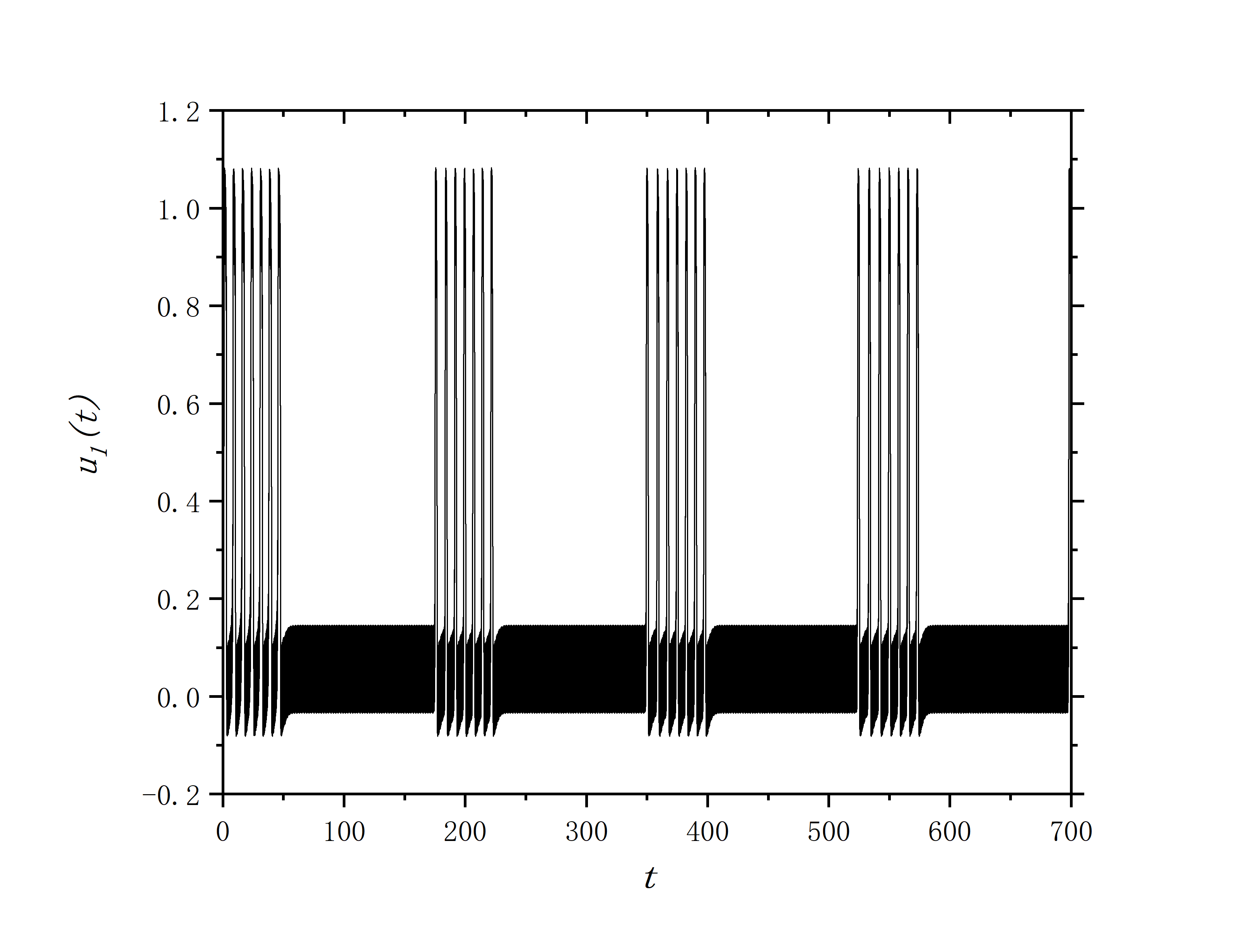
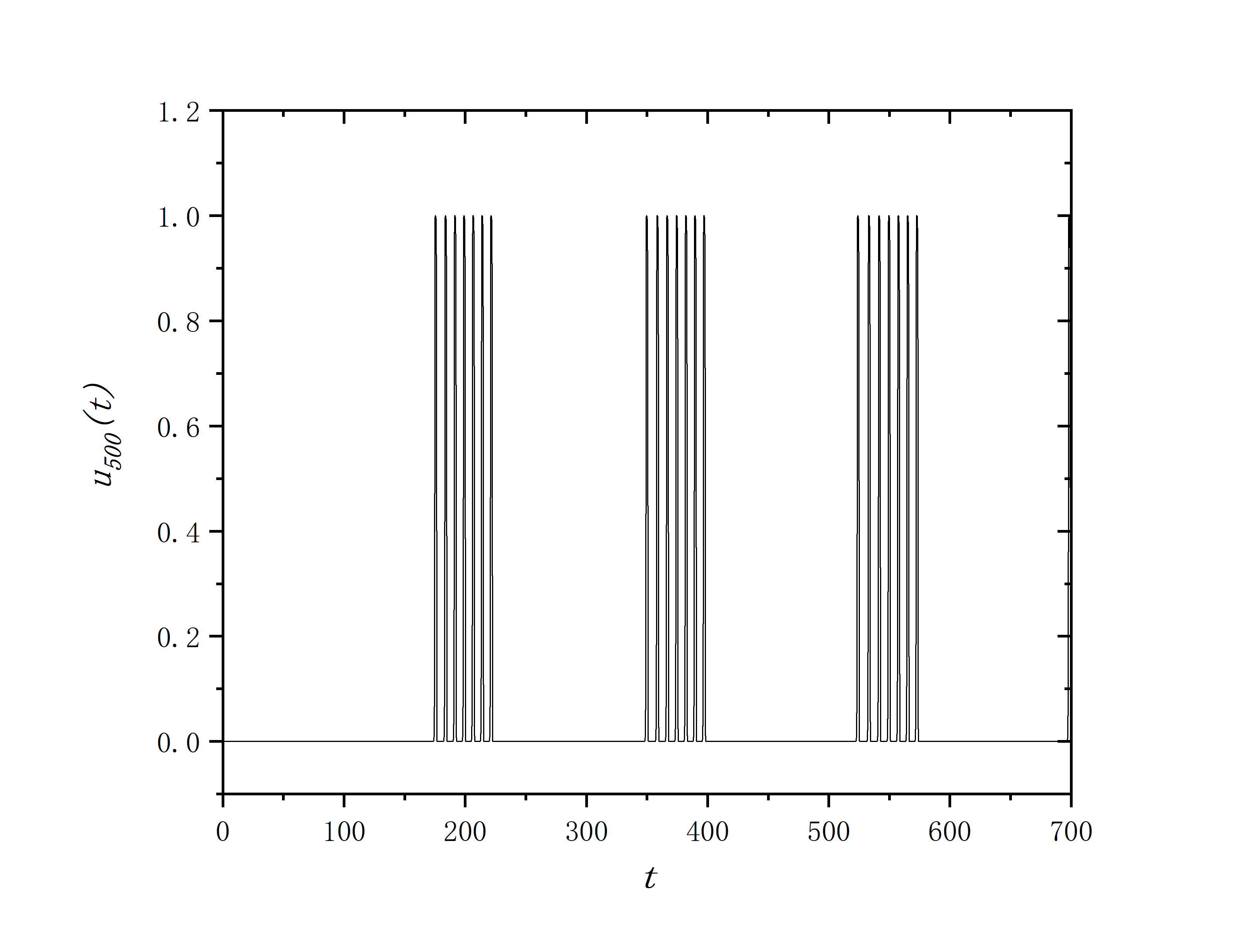
module BOM
implicit none
integer,parameter :: L=500,MaxT=35000
integer,allocatable :: ring_matrix(:,:)
real,parameter :: h=0.02,PI=3.1415926
contains
subroutine fnf()
implicit none
real :: epsilon=0.04,a=0.84,b=0.07,D=1.0,A1=2.5,f=4.5,effect,u(L),v(L),fun_u(L),fun_v(L),delta,stepT
integer :: i,j,t
u=0.0
v=0.0
do t=1,MaxT,1
do i=1,L,1
stepT=h*t
effect=0.0
do j=1,L,1
effect=effect+ring_matrix(i,j)*(u(j)-u(i))
end do
if(i==1) then
delta=1.0
else
delta=0.0
end if
if(i==1.and.t<=2500) then
fun_u(i)=u(i)+h*(1.0/epsilon*(u(i)*(1.0-u(i))*(u(i)-(v(i)+b)/a))+A1*sin(2.0*PI*f*stepT))
else
fun_u(i)=u(i)+h*(1.0/epsilon*(u(i)*(1.0-u(i))*(u(i)-(v(i)+b)/a))+delta*A1*sin(2.0*PI*f*stepT)+D*effect)
end if
if(u(i)<1.0/3.0) then
fun_v(i)=v(i)+h*(-v(i))
else if(u(i)>=1.0/3.0.and.u(i)<=1.0) then
fun_v(i)=v(i)+h*(1.0-6.75*u(i)*(u(i)-1.0)**2-v(i))
else if(u(i)>1.0) then
fun_v(i)=v(i)+h*(1.0-v(i))
end if
if(mod(t,100)==0)then
write(20,*) i,t*h,u(i)
end if
end do
u=fun_u
v=fun_v
end do
close(20)
close(40)
return
end subroutine fnf
subroutine ring(node_number)
implicit none
integer :: node_number,a
allocate(ring_matrix(node_number,node_number))
ring_matrix=0
do a=2,node_number,1
ring_matrix(a,a-1)=1
end do
ring_matrix(1,node_number)=1
end subroutine ring
end module BOM
program main
use BOM
implicit none
open(20,file="data_1.txt")
open(40,file="data_500.txt")
call ring(L)
call fnf
deallocate(ring_matrix)
end program main
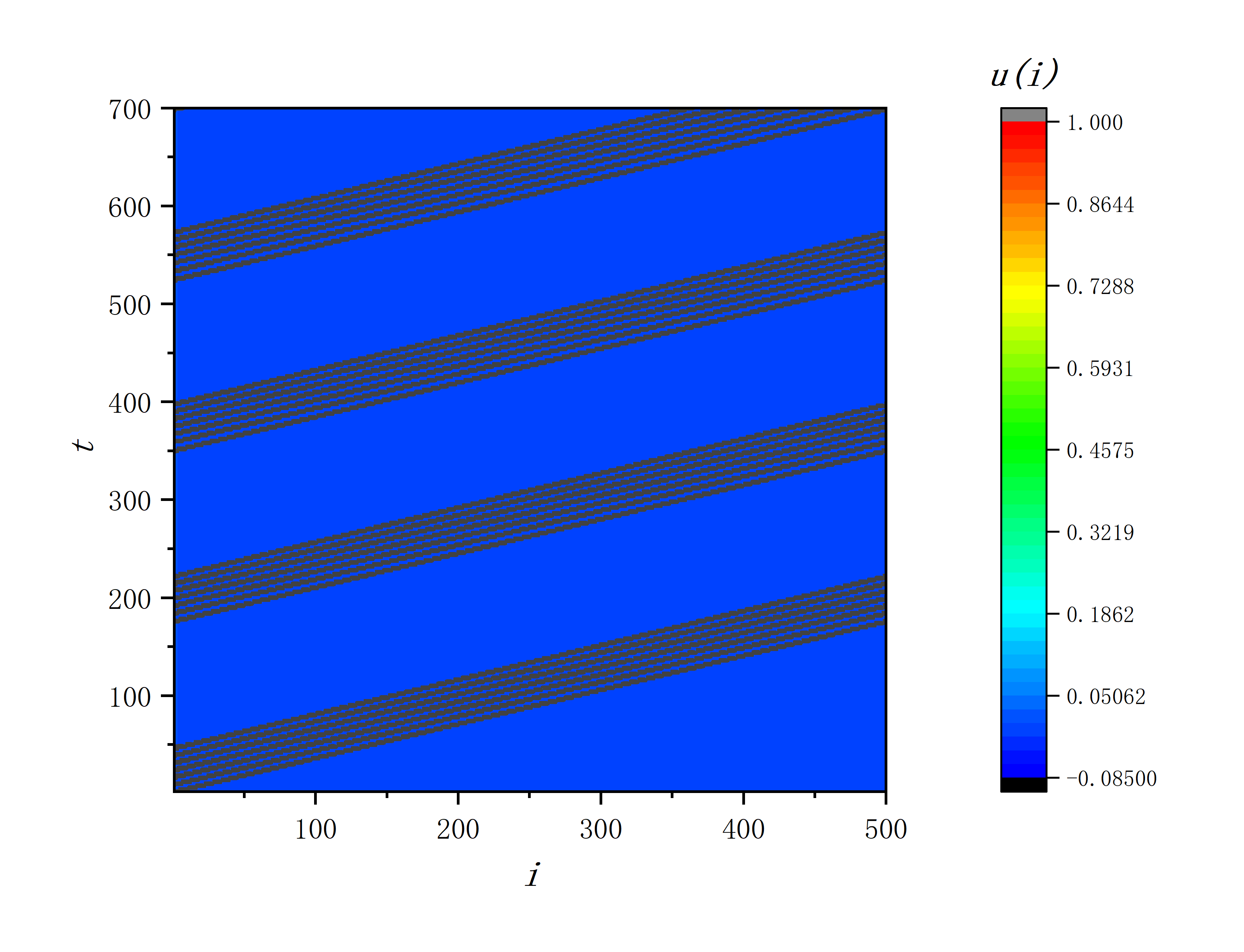
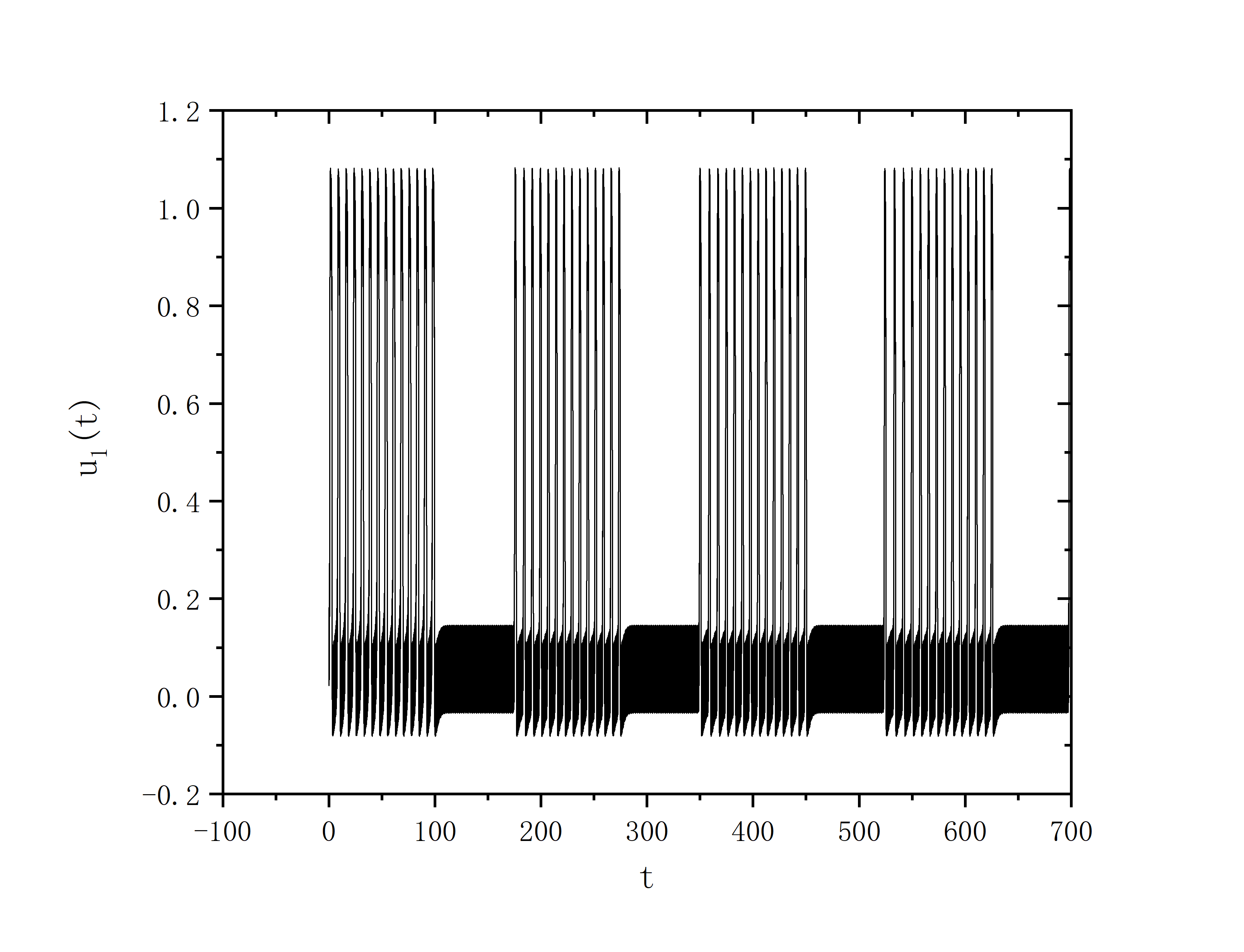
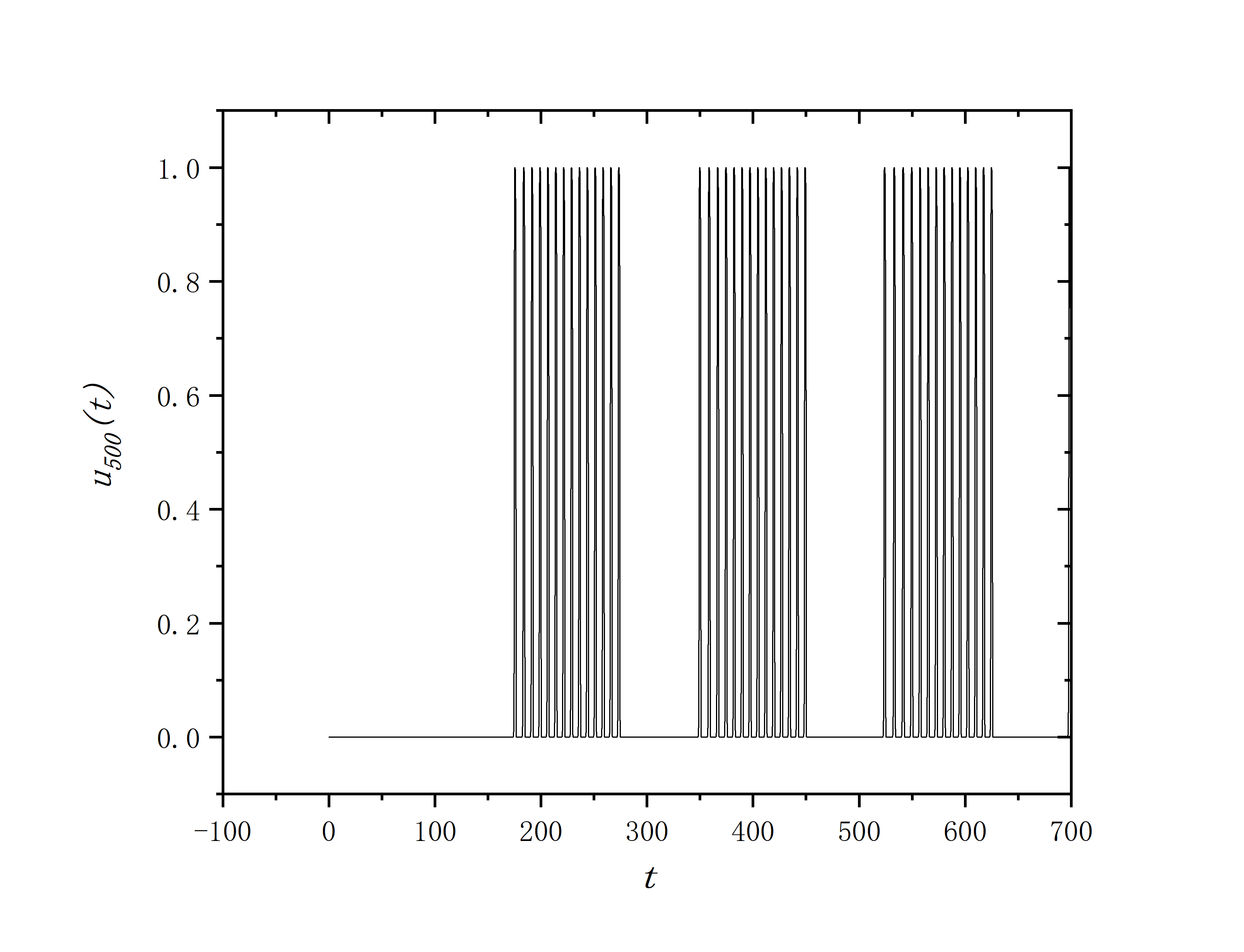
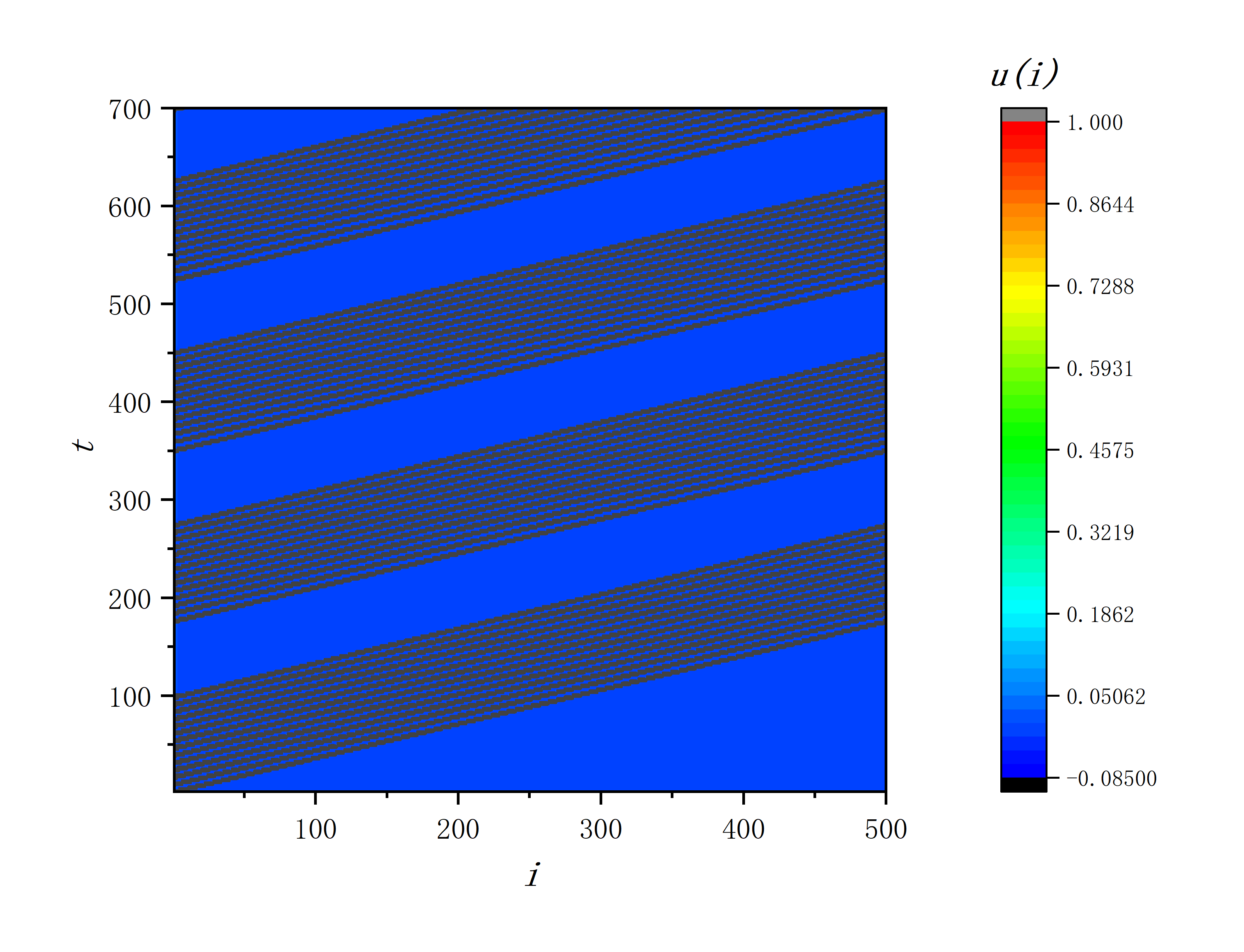
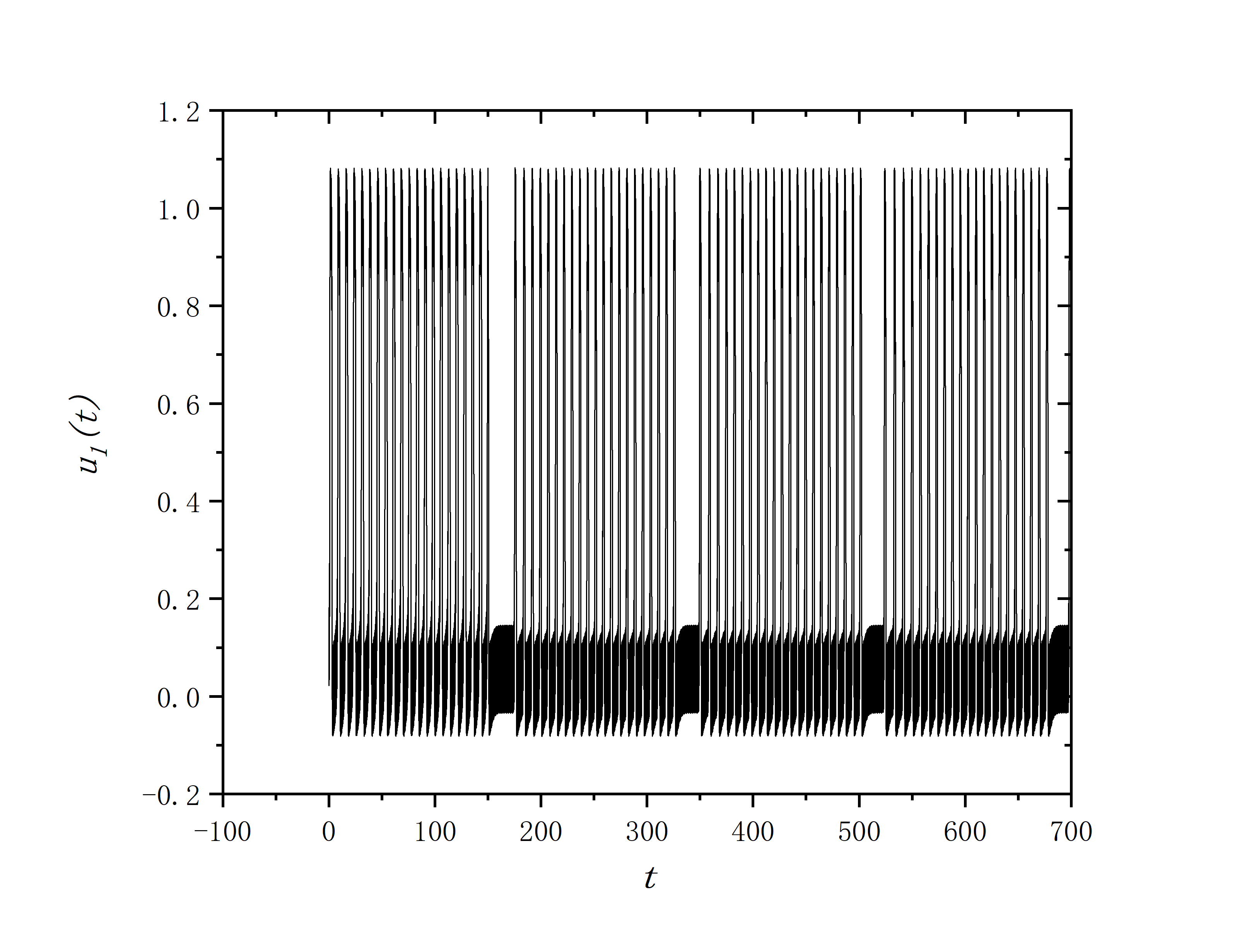
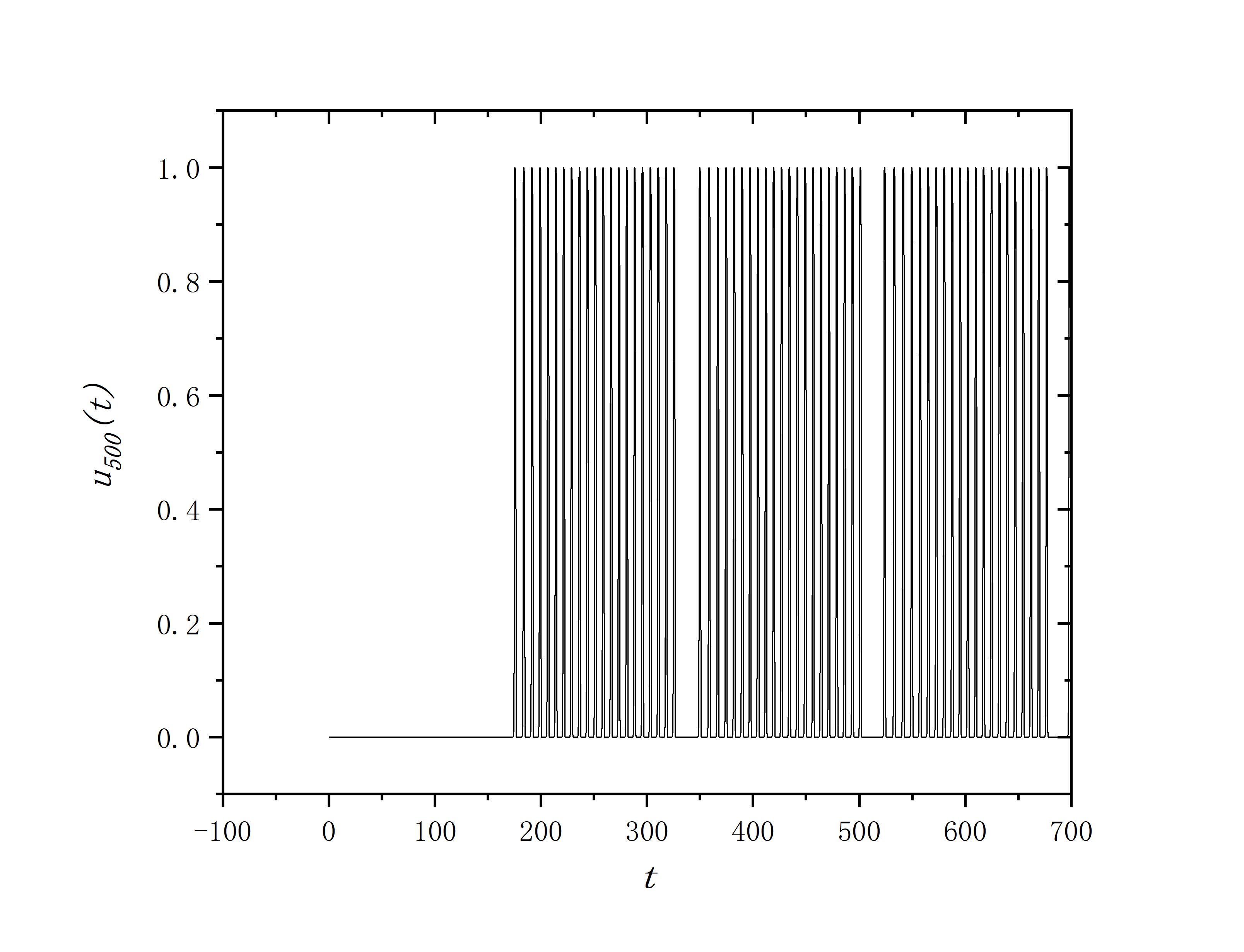
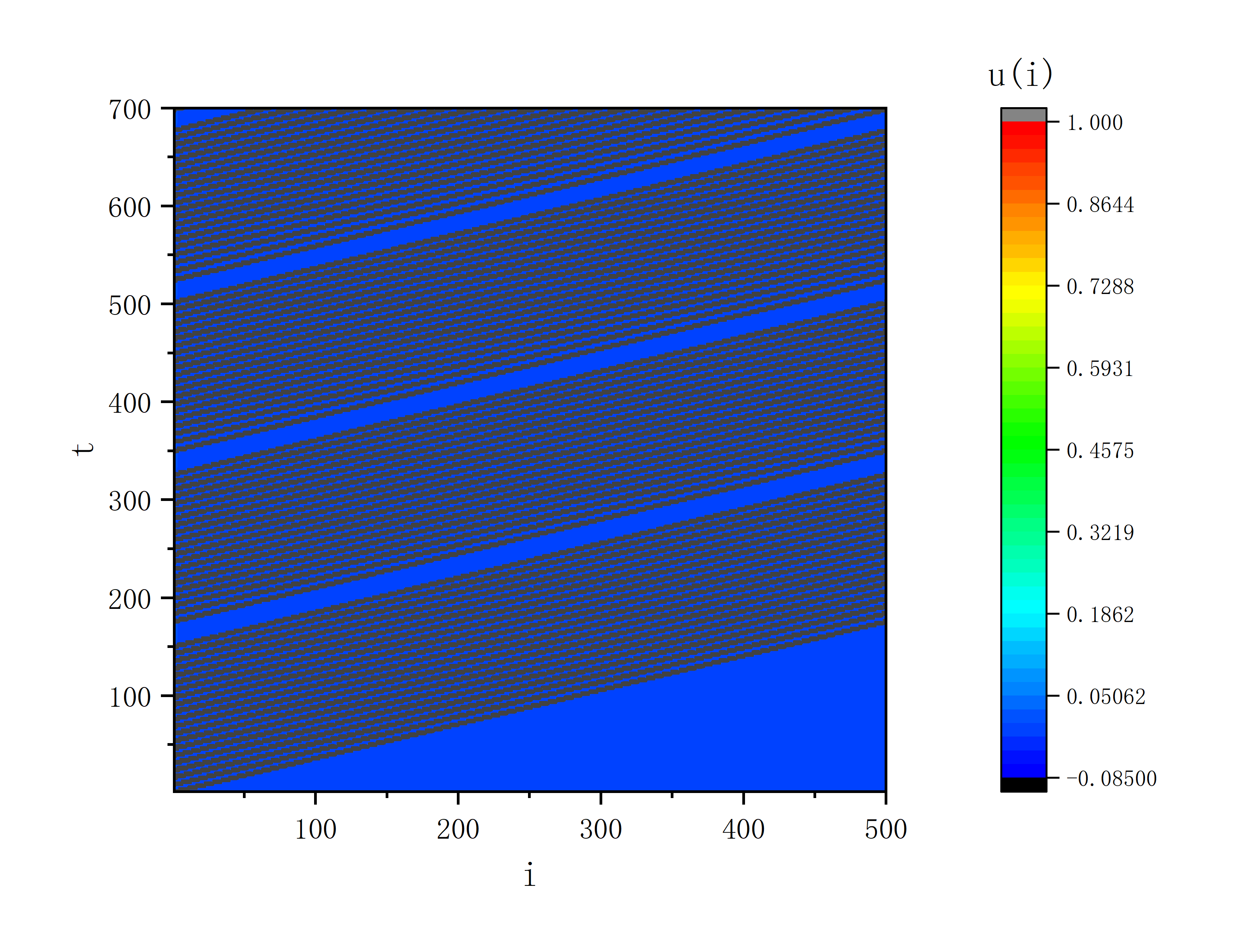
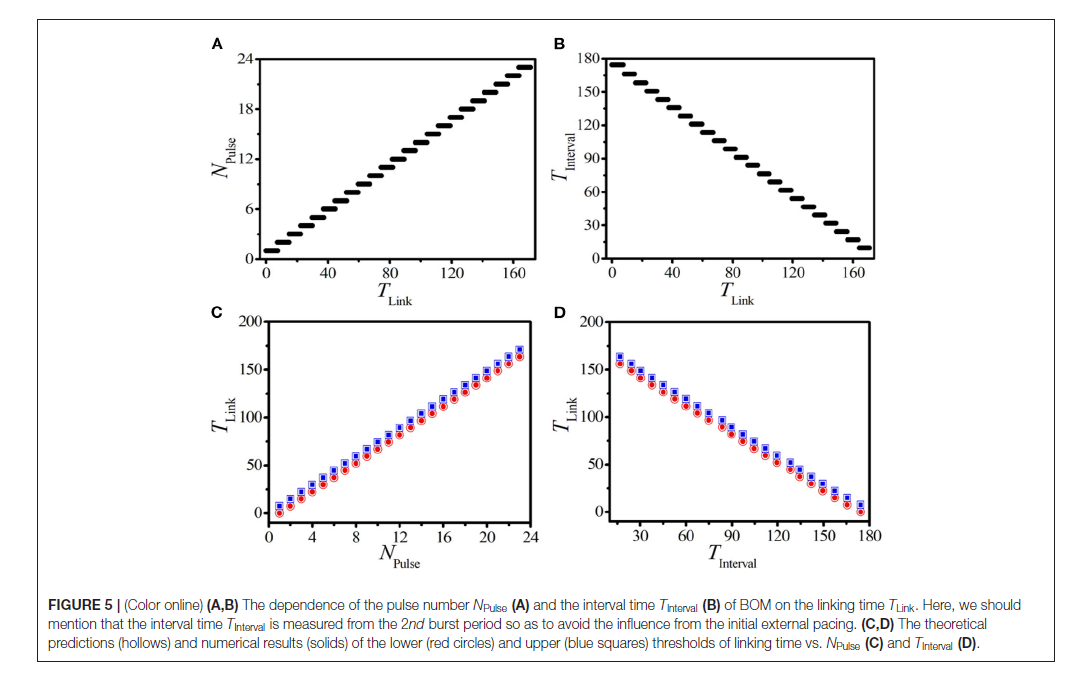
module BOM
implicit none
integer,parameter :: L=500,MaxT=8750
integer,allocatable :: ring_matrix(:,:)
real,parameter :: h=0.02,PI=3.1415926
contains
subroutine fnf(T_Link)
implicit none
real :: epsilon=0.04,a=0.84,b=0.07,D=1.0,A1=2.5,f=4.5,effect,u(L),v(L),fun_u(L),fun_v(L),delta,stepT,T_Link,T_Interval=0.0,&
U_change(1:MaxT)
integer :: i,j,t,N_pulse=0,count_number=0
u=0.0
v=0.0
do t=1,MaxT,1
do i=1,L,1
stepT=h*t
effect=0.0
do j=1,L,1
effect=effect+ring_matrix(i,j)*(u(j)-u(i))
end do
if(i==1) then
delta=1.0
else
delta=0.0
end if
if(i==1.and.stepT<=T_Link) then
fun_u(i)=u(i)+h*(1.0/epsilon*(u(i)*(1.0-u(i))*(u(i)-(v(i)+b)/a))+A1*sin(2.0*PI*f*stepT))
else
fun_u(i)=u(i)+h*(1.0/epsilon*(u(i)*(1.0-u(i))*(u(i)-(v(i)+b)/a))+delta*A1*sin(2.0*PI*f*stepT)+D*effect)
end if
if(u(i)<1.0/3.0) then
fun_v(i)=v(i)+h*(-v(i))
else if(u(i)>=1.0/3.0.and.u(i)<=1.0) then
fun_v(i)=v(i)+h*(1.0-6.75*u(i)*(u(i)-1.0)**2-v(i))
else if(u(i)>1.0) then
fun_v(i)=v(i)+h*(1.0-v(i))
end if
if(i==1) then
U_change(t)=fun_u(i)
if(U_change(t)>0.5) then
count_number=count_number+1
else if(count_number>30.and.U_change(t)<0.2) then
N_pulse=N_pulse+1
count_number=0
end if
end if
end do
u=fun_u
v=fun_v
end do
write(20,*) T_Link,N_pulse
N_pulse=0
return
end subroutine fnf
subroutine ring(node_number)
implicit none
integer :: node_number,a
allocate(ring_matrix(node_number,node_number))
ring_matrix=0
do a=2,node_number,1
ring_matrix(a,a-1)=1
end do
ring_matrix(1,node_number)=1
end subroutine ring
end module BOM
program main
use BOM
implicit none
real :: T_Link=0.0
integer :: i
open(20,file="T_LinkN_Pulse.txt")
open(40,file="T_LinkT_Interval.txt")
call ring(L)
do i=1,8751,1
T_Link=i*h-h
call fnf(T_Link)
end do
close(20)
close(40)
deallocate(ring_matrix)
end program main
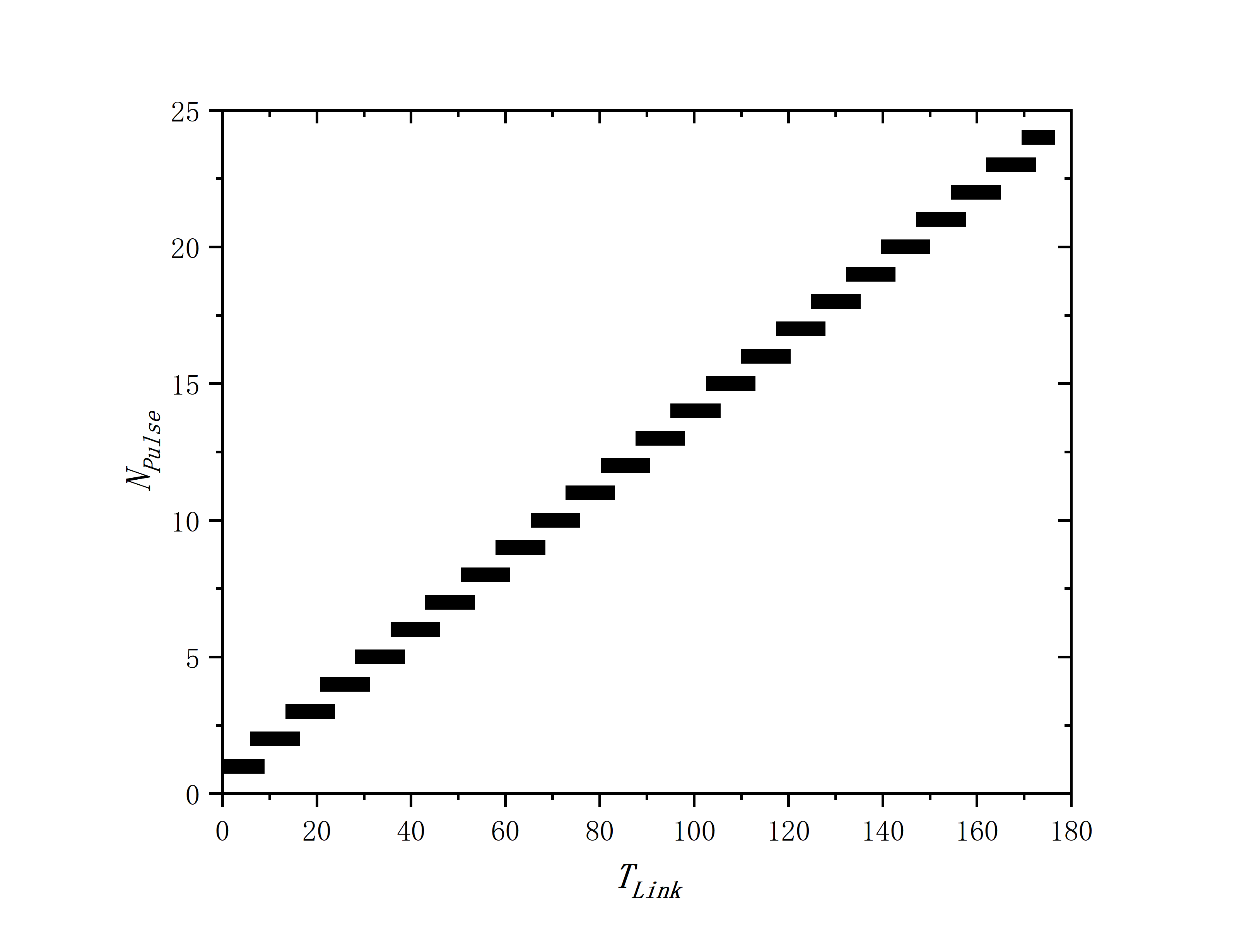
module BOM
implicit none
integer,parameter :: L=500,MaxT=9000
integer,allocatable :: ring_matrix(:,:)
real,parameter :: h=0.02,PI=3.1415926
contains
subroutine fnf(T_Link)
implicit none
real :: epsilon=0.04,a=0.84,b=0.07,D=1.0,A1=2.5,f=4.5,effect,u(L),v(L),fun_u(L),fun_v(L),delta,stepT,T_Link,T_Interval=0.0,&
U_change(1:MaxT)
integer :: i,j,t,N_pulse=0,count_number=0
u=0.0
v=0.0
do t=1,MaxT,1
do i=1,L,1
stepT=h*t
effect=0.0
do j=1,L,1
effect=effect+ring_matrix(i,j)*(u(j)-u(i))
end do
if(i==1) then
delta=1.0
else
delta=0.0
end if
if(i==1.and.stepT<=T_Link) then
fun_u(i)=u(i)+h*(1.0/epsilon*(u(i)*(1.0-u(i))*(u(i)-(v(i)+b)/a))+A1*sin(2.0*PI*f*stepT))
else
fun_u(i)=u(i)+h*(1.0/epsilon*(u(i)*(1.0-u(i))*(u(i)-(v(i)+b)/a))+delta*A1*sin(2.0*PI*f*stepT)+D*effect)
end if
if(u(i)<1.0/3.0) then
fun_v(i)=v(i)+h*(-v(i))
else if(u(i)>=1.0/3.0.and.u(i)<=1.0) then
fun_v(i)=v(i)+h*(1.0-6.75*u(i)*(u(i)-1.0)**2-v(i))
else if(u(i)>1.0) then
fun_v(i)=v(i)+h*(1.0-v(i))
end if
if(i==2) then
U_change(t)=fun_u(i)
if(U_change(t)<0.5) then
count_number=count_number+1
else if(count_number>270.and.U_change(t)>0.5) then
T_Interval=count_number*h
count_number=0
else
count_number=0
end if
end if
end do
u=fun_u
v=fun_v
end do
write(*,*) T_Link,T_Interval
write(40,*) T_Link,T_Interval
N_pulse=0
return
end subroutine fnf
subroutine ring(node_number)
implicit none
integer :: node_number,a
allocate(ring_matrix(node_number,node_number))
ring_matrix=0
do a=2,node_number,1
ring_matrix(a,a-1)=1
end do
ring_matrix(1,node_number)=1
end subroutine ring
end module BOM
program main
use BOM
implicit none
real :: T_Link=0.0
integer :: i
open(20,file="T_LinkN_Pulse.txt")
open(40,file="T_LinkT_Interval.txt")
call ring(L)
do i=1,8751,1
T_Link=i*h-h
call fnf(T_Link)
end do
close(20)
close(40)
deallocate(ring_matrix)
end program main
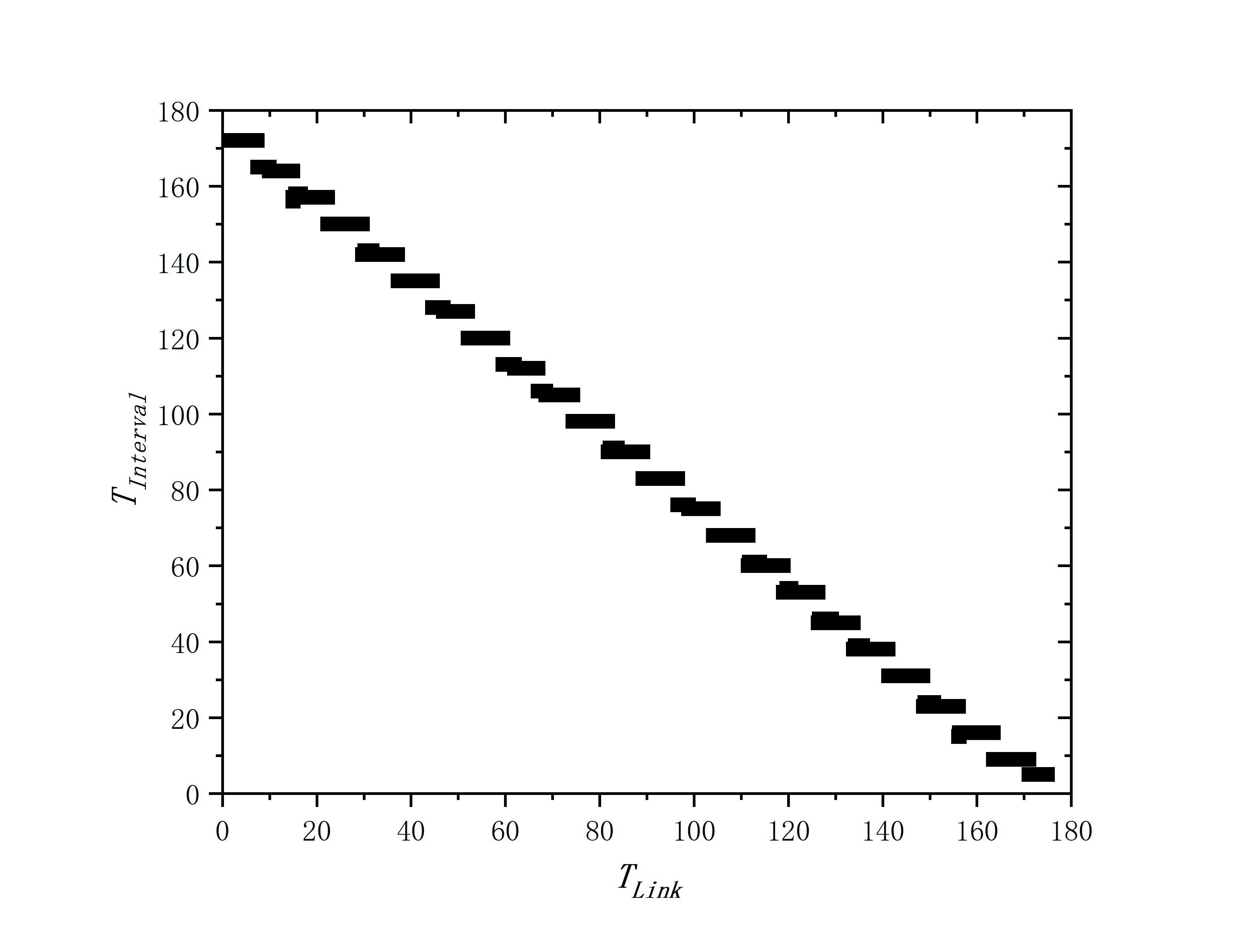
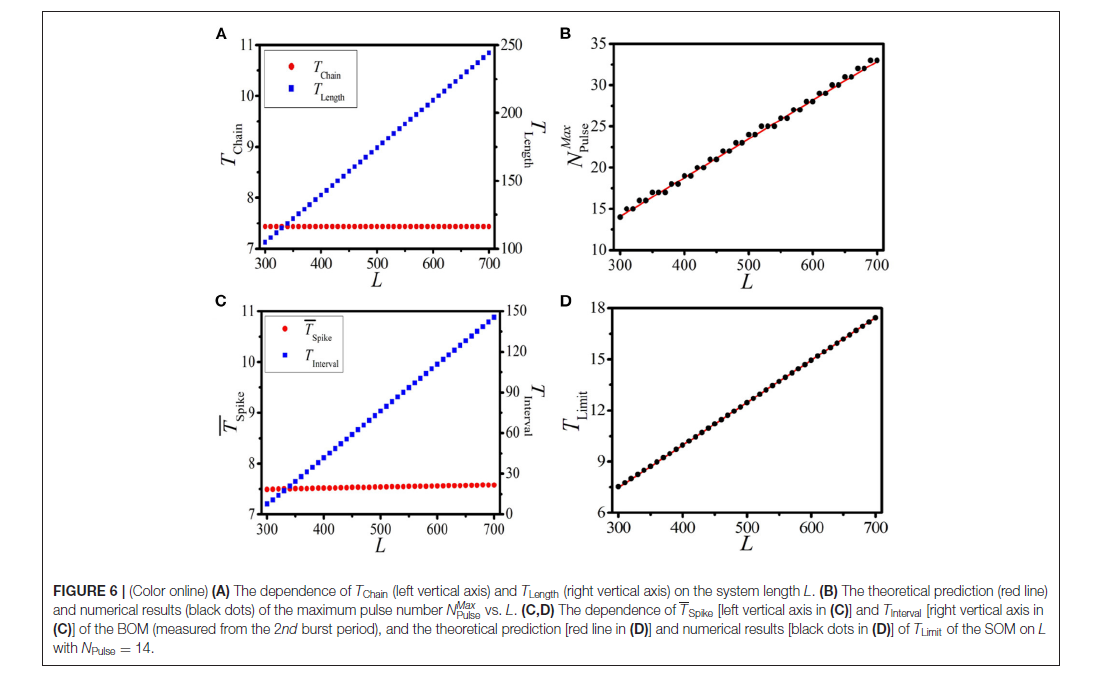
- 这里A图的环不加驱动,给定初始值,传递振荡,一下代码是加了驱动,还没修改。
module BOM
implicit none
integer,parameter :: MaxT=15000
integer,allocatable :: ring_matrix(:,:)
real,parameter :: h=0.02,PI=3.1415926
contains
subroutine fnf(L)
implicit none
real :: epsilon=0.04,a=0.84,b=0.07,D=1.0,A1=2.5,f=4.5,effect,u(L),v(L),fun_u(L),fun_v(L),delta,stepT,&
U_change(1:MaxT),T_chain=0.0,T_peak(2),T_length=0.0
integer :: i,j,t,L,N_pulse=0,count_number=0
u=0.0
v=0.0
do t=1,MaxT,1
do i=1,L,1
stepT=h*t
effect=0.0
do j=1,L,1
effect=effect+ring_matrix(i,j)*(u(j)-u(i))
end do
if(i==1) then
delta=1.0
else
delta=0.0
end if
if(i==1.and.stepT<=10) then
fun_u(i)=u(i)+h*(1.0/epsilon*(u(i)*(1.0-u(i))*(u(i)-(v(i)+b)/a))+A1*sin(2.0*PI*f*stepT))
else
fun_u(i)=u(i)+h*(1.0/epsilon*(u(i)*(1.0-u(i))*(u(i)-(v(i)+b)/a))+delta*A1*sin(2.0*PI*f*stepT)+D*effect)
end if
if(u(i)<1.0/3.0) then
fun_v(i)=v(i)+h*(-v(i))
else if(u(i)>=1.0/3.0.and.u(i)<=1.0) then
fun_v(i)=v(i)+h*(1.0-6.75*u(i)*(u(i)-1.0)**2-v(i))
else if(u(i)>1.0) then
fun_v(i)=v(i)+h*(1.0-v(i))
end if
if(i==1) then
U_change(t)=fun_u(i)
if(U_change(t)>0.5) then
count_number=count_number+1
if(N_pulse==2) then
T_length=stepT
end if
else if(count_number>30.and.U_change(t)<0.2) then
N_pulse=N_pulse+1
count_number=0
if(N_pulse==1) then
T_peak(1)=stepT
end if
if(N_pulse==2) then
T_peak(2)=stepT
end if
end if
end if
end do
u=fun_u
v=fun_v
end do
T_chain=T_peak(2)-T_peak(1)
write(20,*) L,T_chain,T_length
N_pulse=0
return
end subroutine fnf
subroutine ring(node_number)
implicit none
integer :: node_number,a
allocate(ring_matrix(node_number,node_number))
ring_matrix=0
do a=2,node_number,1
ring_matrix(a,a-1)=1
end do
ring_matrix(1,node_number)=1
end subroutine ring
end module BOM
program main
use BOM
implicit none
integer :: i,L
open(20,file="L_Tchain_Tlength.txt")
do i=300,700,1
call ring(i)
call fnf(i)
deallocate(ring_matrix)
end do
close(20)
end program main
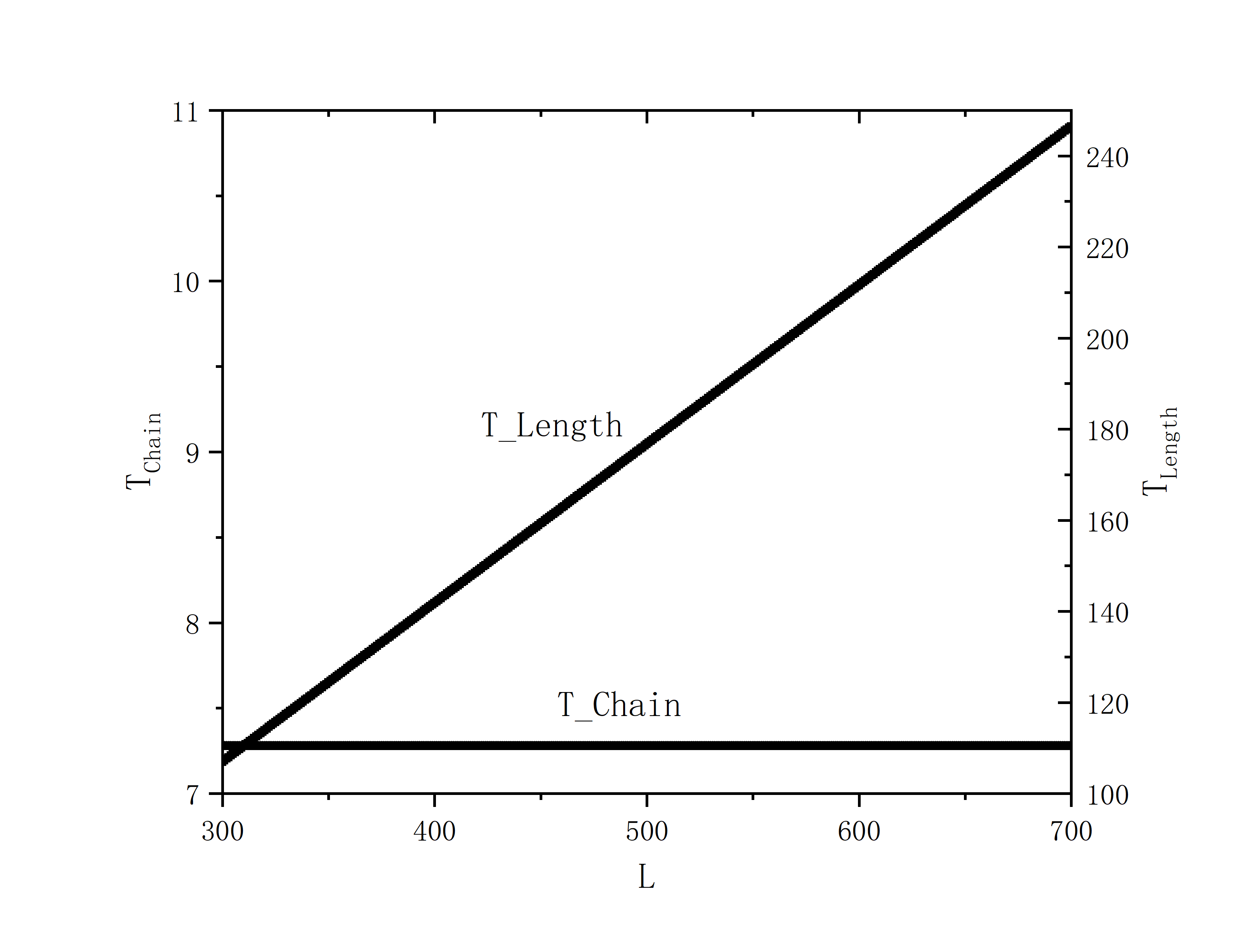
module BOM
implicit none
integer,allocatable :: ring_matrix(:,:)
real,parameter :: h=0.02,PI=3.1415926
contains
subroutine fnf(L,T_link,MaxT)
implicit none
integer :: i,j,t,L,N_pulse=0,count_number=0,MaxT
real :: epsilon=0.04,a=0.84,b=0.07,D=1.0,A1=2.5,f=4.5,effect,u(L),v(L),fun_u(L),fun_v(L),delta,stepT,&
U_change(1:MaxT),T_chain=0.0,T_peak(2),T_length=0.0,T_link
u=0.0
v=0.0
do t=1,MaxT,1
do i=1,L,1
stepT=h*t
effect=0.0
do j=1,L,1
effect=effect+ring_matrix(i,j)*(u(j)-u(i))
end do
if(i==1) then
delta=1.0
else
delta=0.0
end if
if(i==1.and.stepT<=T_link) then
fun_u(i)=u(i)+h*(1.0/epsilon*(u(i)*(1.0-u(i))*(u(i)-(v(i)+b)/a))+A1*sin(2.0*PI*f*stepT))
else
fun_u(i)=u(i)+h*(1.0/epsilon*(u(i)*(1.0-u(i))*(u(i)-(v(i)+b)/a))+delta*A1*sin(2.0*PI*f*stepT)+D*effect)
end if
if(u(i)<1.0/3.0) then
fun_v(i)=v(i)+h*(-v(i))
else if(u(i)>=1.0/3.0.and.u(i)<=1.0) then
fun_v(i)=v(i)+h*(1.0-6.75*u(i)*(u(i)-1.0)**2-v(i))
else if(u(i)>1.0) then
fun_v(i)=v(i)+h*(1.0-v(i))
end if
if(i==1) then
U_change(t)=fun_u(i)
if(U_change(t)>0.5) then
count_number=count_number+1
else if(count_number>=97.and.U_change(t)<0.2) then
N_pulse=N_pulse+1
count_number=0
end if
end if
end do
u=fun_u
v=fun_v
end do
write(20,*) L,N_pulse,T_link,MaxT
N_pulse=0
return
end subroutine fnf
subroutine ring(node_number)
implicit none
integer :: node_number,a
allocate(ring_matrix(node_number,node_number))
ring_matrix=0
do a=2,node_number,1
ring_matrix(a,a-1)=1
end do
ring_matrix(1,node_number)=1
end subroutine ring
end module BOM
program main
use BOM
implicit none
integer :: i,j=1,L
real(kind=4) :: T_Link_Array(41)=(/106.879997,110.399994,113.899994,117.399994,120.860001,124.360001,127.879997,131.300003,&
134.819992,138.339996,141.779999,145.279999,148.800003,152.259995,155.73999,159.259995,162.759995,166.199997,&
169.699997,173.220001,176.660004,180.159988,183.679993,187.139999,190.619995,194.139999,197.639999,201.080002,&
204.599991,208.099991,211.539993,215.059998,218.559998,222.019989,225.5,229.019989,232.519989,235.959991,&
239.479996,243.0,246.419998/)
open(20,file="L_N_pulse_max.txt")
do i=300,700,10
call ring(i)
call fnf(i,T_Link_Array(j),int(T_Link_Array(j)/0.02))
deallocate(ring_matrix)
j=j+1
end do
close(20)
end program main
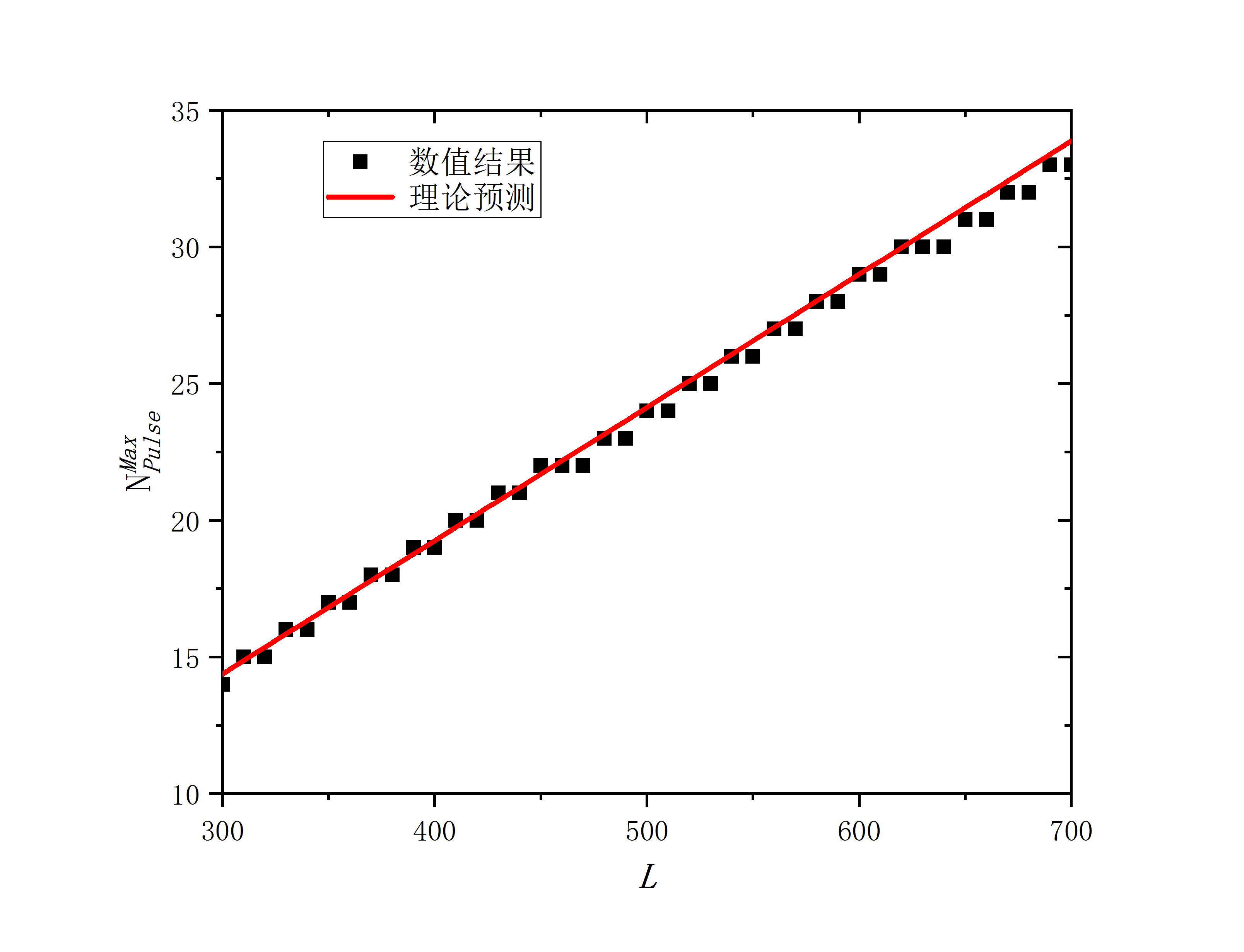
module BOM
implicit none
integer,allocatable :: ring_matrix(:,:)
real,parameter :: h=0.02,PI=3.1415926
contains
subroutine fnf(L,MaxT)
implicit none
integer :: i,j,t,L,N_pulse=0,count_number=0,MaxT
real :: epsilon=0.04,a=0.84,b=0.07,D=1.0,A1=2.5,f=4.5,effect,u(L),v(L),fun_u(L),fun_v(L),delta,stepT,&
U_change(1:MaxT),T_spike=0.0,T_interval=0.0
u=0.0
v=0.0
do t=1,MaxT,1
do i=1,L,1
stepT=h*t
effect=0.0
do j=1,L,1
effect=effect+ring_matrix(i,j)*(u(j)-u(i))
end do
if(i==1) then
delta=1.0
else
delta=0.0
end if
if(i==1.and.stepT<100) then
fun_u(i)=u(i)+h*(1.0/epsilon*(u(i)*(1.0-u(i))*(u(i)-(v(i)+b)/a))+A1*sin(2.0*PI*f*stepT))
else
fun_u(i)=u(i)+h*(1.0/epsilon*(u(i)*(1.0-u(i))*(u(i)-(v(i)+b)/a))+delta*A1*sin(2.0*PI*f*stepT)+D*effect)
end if
if(u(i)<1.0/3.0) then
fun_v(i)=v(i)+h*(-v(i))
else if(u(i)>=1.0/3.0.and.u(i)<=1.0) then
fun_v(i)=v(i)+h*(1.0-6.75*u(i)*(u(i)-1.0)**2-v(i))
else if(u(i)>1.0) then
fun_v(i)=v(i)+h*(1.0-v(i))
end if
if(i==2) then
U_change(t)=fun_u(i)
if(U_change(t)>0.5) then
count_number=count_number+1
else if(count_number>70.and.U_change(t)<0.2) then
N_pulse=N_pulse+1
if(N_pulse==14) then
T_spike=stepT/13.0
T_interval=MaxT*0.02-stepT
end if
count_number=0
end if
end if
end do
u=fun_u
v=fun_v
end do
write(20,*) L,T_spike
write(40,*) L,T_interval
N_pulse=0
return
end subroutine fnf
subroutine ring(node_number)
implicit none
integer :: node_number,a
allocate(ring_matrix(node_number,node_number))
ring_matrix=0
do a=2,node_number,1
ring_matrix(a,a-1)=1
end do
ring_matrix(1,node_number)=1
end subroutine ring
end module BOM
program main
use BOM
implicit none
integer :: i,j=1,L
real(kind=4) :: T_Link_Array(41)=(/106.879997,110.399994,113.899994,117.399994,120.860001,124.360001,127.879997,131.300003,&
134.819992,138.339996,141.779999,145.279999,148.800003,152.259995,155.73999,159.259995,162.759995,166.199997,&
169.699997,173.220001,176.660004,180.159988,183.679993,187.139999,190.619995,194.139999,197.639999,201.080002,&
204.599991,208.099991,211.539993,215.059998,218.559998,222.019989,225.5,229.019989,232.519989,235.959991,&
239.479996,243.0,246.419998/)
open(20,file="L_T_Spike.txt")
open(40,file="L_T_Interval.txt")
do i=300,700,10
call ring(i)
call fnf(i,int(T_Link_Array(j)/0.02))
deallocate(ring_matrix)
j=j+1
end do
close(20)
end program main
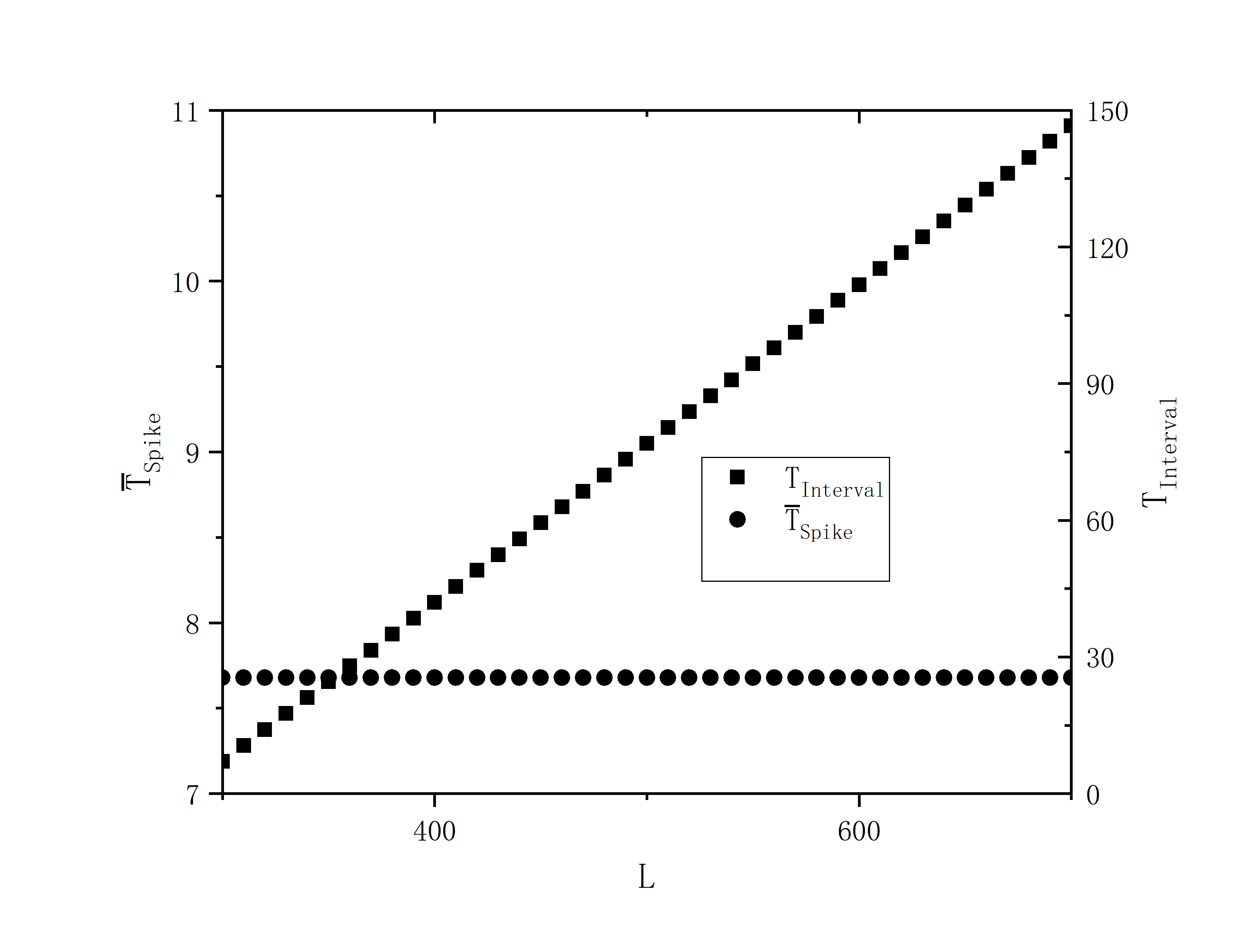
module BOM
implicit none
integer,allocatable :: ring_matrix(:,:)
real,parameter :: h=0.02,PI=3.1415926
contains
subroutine fnf(L,MaxT)
implicit none
integer :: i,j,t,L,N_pulse=0,count_number=0,MaxT
real :: epsilon=0.04,a=0.84,b=0.07,D=1.0,A1=2.5,f=4.5,effect,u(L),v(L),fun_u(L),fun_v(L),delta,stepT,T_limit
u=0.0
v=0.0
do t=1,MaxT,1
do i=1,L,1
stepT=h*t
effect=0.0
do j=1,L,1
effect=effect+ring_matrix(i,j)*(u(j)-u(i))
end do
if(i==1) then
delta=1.0
else
delta=0.0
end if
if(i==1.and.stepT<100) then
fun_u(i)=u(i)+h*(1.0/epsilon*(u(i)*(1.0-u(i))*(u(i)-(v(i)+b)/a))+A1*sin(2.0*PI*f*stepT))
else
fun_u(i)=u(i)+h*(1.0/epsilon*(u(i)*(1.0-u(i))*(u(i)-(v(i)+b)/a))+delta*A1*sin(2.0*PI*f*stepT)+D*effect)
end if
if(u(i)<1.0/3.0) then
fun_v(i)=v(i)+h*(-v(i))
else if(u(i)>=1.0/3.0.and.u(i)<=1.0) then
fun_v(i)=v(i)+h*(1.0-6.75*u(i)*(u(i)-1.0)**2-v(i))
else if(u(i)>1.0) then
fun_v(i)=v(i)+h*(1.0-v(i))
end if
end do
u=fun_u
v=fun_v
end do
T_limit=MaxT*h/14.0
write(20,*) L,T_limit
N_pulse=0
return
end subroutine fnf
subroutine ring(node_number)
implicit none
integer :: node_number,a
allocate(ring_matrix(node_number,node_number))
ring_matrix=0
do a=2,node_number,1
ring_matrix(a,a-1)=1
end do
ring_matrix(1,node_number)=1
end subroutine ring
end module BOM
program main
use BOM
implicit none
integer :: i,j=1,L
real(kind=4) :: T_Link_Array(41)=(/106.879997,110.399994,113.899994,117.399994,120.860001,124.360001,127.879997,131.300003,&
134.819992,138.339996,141.779999,145.279999,148.800003,152.259995,155.73999,159.259995,162.759995,166.199997,&
169.699997,173.220001,176.660004,180.159988,183.679993,187.139999,190.619995,194.139999,197.639999,201.080002,&
204.599991,208.099991,211.539993,215.059998,218.559998,222.019989,225.5,229.019989,232.519989,235.959991,&
239.479996,243.0,246.419998/)
open(20,file="L_T_Limit.txt")
do i=300,700,10
call ring(i)
call fnf(i,int(T_Link_Array(j)/0.02))
deallocate(ring_matrix)
j=j+1
end do
close(20)
end program main
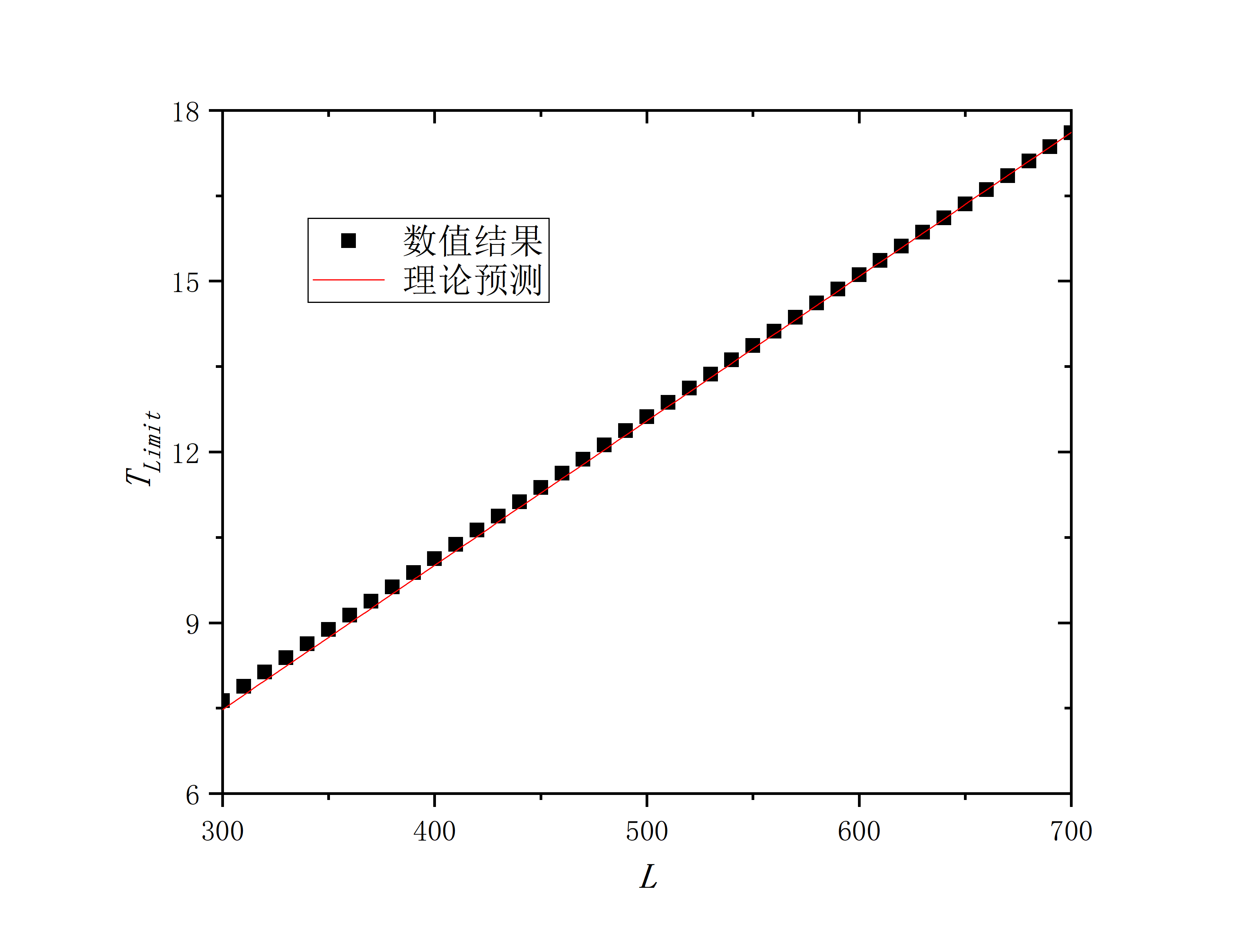
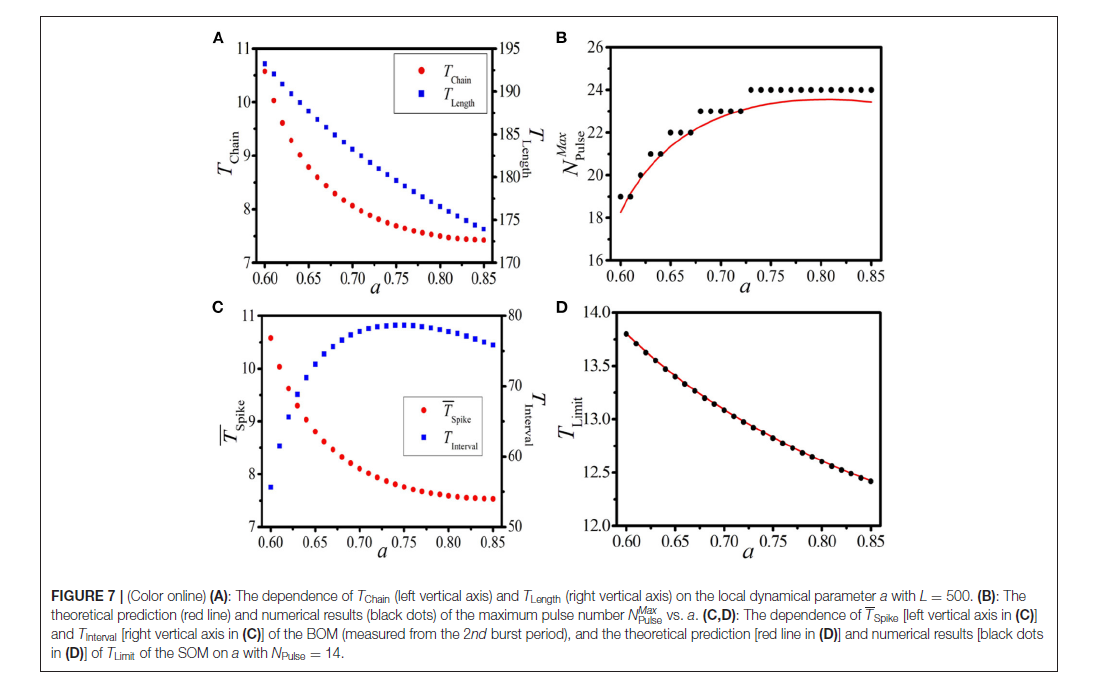
module BOM
implicit none
integer,parameter :: MaxT=10000,L=500
integer,allocatable :: ring_matrix(:,:)
real,parameter :: h=0.02,PI=3.1415926
contains
subroutine fnf(a)
implicit none
real :: epsilon=0.04,a,b=0.07,D=1.0,A1=2.5,f=4.5,effect,u(L),v(L),fun_u(L),fun_v(L),delta,stepT,&
U_change(1:MaxT),T_chain=0.0,T_peak(2),T_length=0.0
integer :: i,j,t,L,N_pulse=0,count_number=0
logical :: status
u=0.0
v=0.0
status=.true.
do t=1,MaxT,1
do i=1,L,1
stepT=h*t
effect=0.0
do j=1,L,1
effect=effect+ring_matrix(i,j)*(u(j)-u(i))
end do
if(i==1) then
delta=1.0
else
delta=0.0
end if
if(i==1.and.status) then
fun_u(i)=u(i)+h*(1.0/epsilon*(u(i)*(1.0-u(i))*(u(i)-(v(i)+b)/a))+A1*sin(2.0*PI*f*stepT))
else
fun_u(i)=u(i)+h*(1.0/epsilon*(u(i)*(1.0-u(i))*(u(i)-(v(i)+b)/a))+delta*A1*sin(2.0*PI*f*stepT)+D*effect)
end if
if(u(i)<1.0/3.0) then
fun_v(i)=v(i)+h*(-v(i))
else if(u(i)>=1.0/3.0.and.u(i)<=1.0) then
fun_v(i)=v(i)+h*(1.0-6.75*u(i)*(u(i)-1.0)**2-v(i))
else if(u(i)>1.0) then
fun_v(i)=v(i)+h*(1.0-v(i))
end if
if(i==1) then
U_change(t)=fun_u(i)
if(U_change(t)>0.5) then
count_number=count_number+1
if(N_pulse==2) then
T_length=stepT
end if
else if(count_number>=30.and.U_change(t)<0.2) then
N_pulse=N_pulse+1
count_number=0
if(N_pulse==1) then
T_peak(1)=stepT
end if
if(N_pulse==2) then
T_peak(2)=stepT
status=.false.
end if
end if
end if
end do
u=fun_u
v=fun_v
end do
T_chain=T_peak(2)-T_peak(1)
write(20,*) a,T_chain,T_length,N_pulse
N_pulse=0
return
end subroutine fnf
subroutine ring(node_number)
implicit none
integer :: node_number,a
allocate(ring_matrix(node_number,node_number))
ring_matrix=0
do a=2,node_number,1
ring_matrix(a,a-1)=1
end do
ring_matrix(1,node_number)=1
end subroutine ring
end module BOM
program main
use BOM
implicit none
integer :: i
real :: a
open(20,file="a_Tchain_Tlength.txt")
open(40,file="data.txt")
call ring(L)
do i=1,26,1
a=0.59+i*0.01
call fnf(a)
end do
close(20)
deallocate(ring_matrix)
end program main
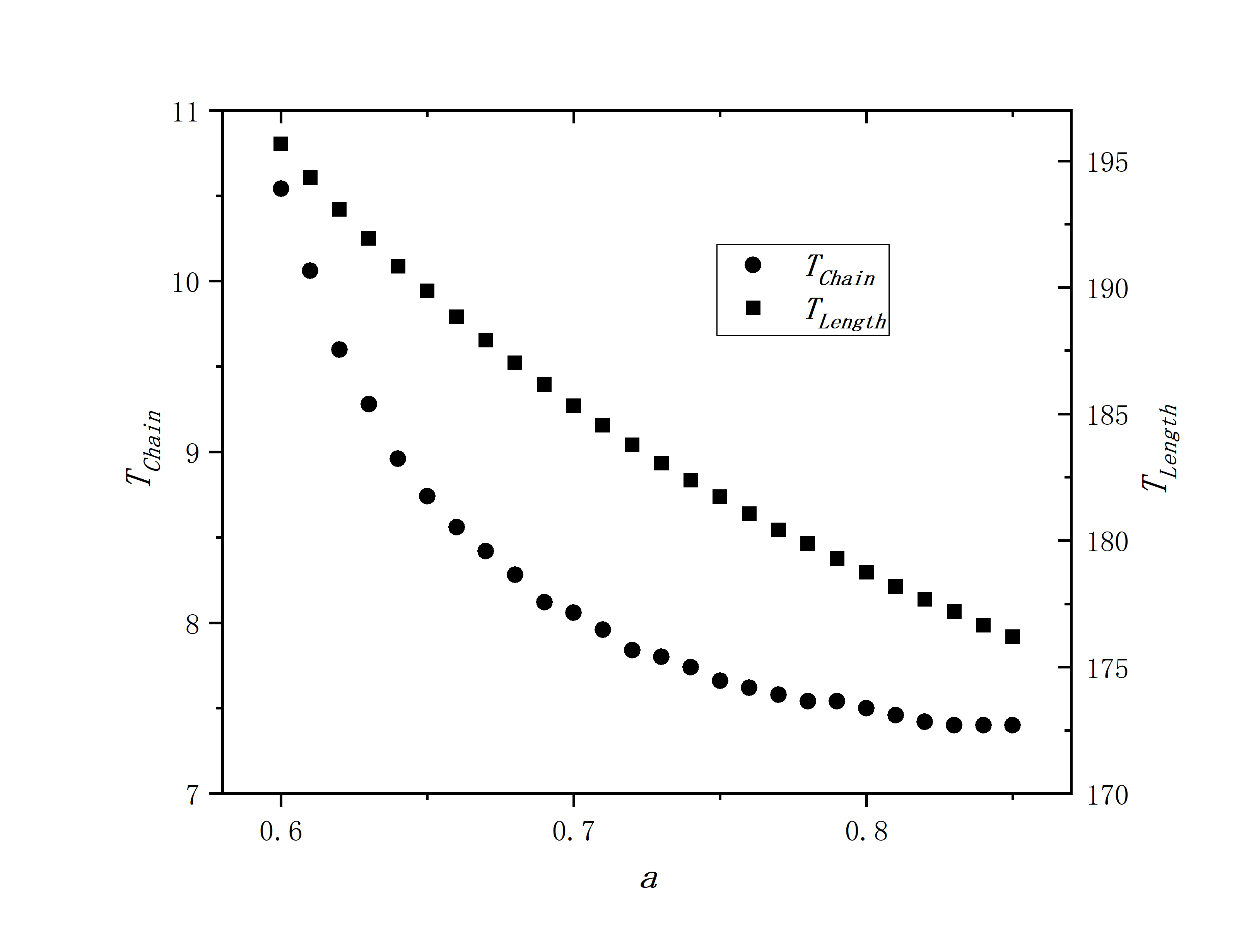
module BOM
implicit none
integer,parameter :: L=500
integer,allocatable :: ring_matrix(:,:)
real,parameter :: h=0.02,PI=3.1415926
contains
subroutine fnf(a,T_link,MaxT)
implicit none
integer :: i,j,t,N_pulse=0,count_number=0,MaxT
real :: epsilon=0.04,a,b=0.07,D=1.0,A1=2.5,f=4.5,effect,u(L),v(L),fun_u(L),fun_v(L),delta,stepT,&
U_change(1:MaxT),T_link
u=0.0
v=0.0
do t=1,MaxT,1
do i=1,L,1
stepT=h*t
effect=0.0
do j=1,L,1
effect=effect+ring_matrix(i,j)*(u(j)-u(i))
end do
if(i==1) then
delta=1.0
else
delta=0.0
end if
if(i==1.and.stepT<=T_link) then
fun_u(i)=u(i)+h*(1.0/epsilon*(u(i)*(1.0-u(i))*(u(i)-(v(i)+b)/a))+A1*sin(2.0*PI*f*stepT))
else
fun_u(i)=u(i)+h*(1.0/epsilon*(u(i)*(1.0-u(i))*(u(i)-(v(i)+b)/a))+delta*A1*sin(2.0*PI*f*stepT)+D*effect)
end if
if(u(i)<1.0/3.0) then
fun_v(i)=v(i)+h*(-v(i))
else if(u(i)>=1.0/3.0.and.u(i)<=1.0) then
fun_v(i)=v(i)+h*(1.0-6.75*u(i)*(u(i)-1.0)**2-v(i))
else if(u(i)>1.0) then
fun_v(i)=v(i)+h*(1.0-v(i))
end if
if(i==1) then
U_change(t)=fun_u(i)
if(U_change(t)>0.5) then
count_number=count_number+1
else if(count_number>30.and.U_change(t)<0.2) then
N_pulse=N_pulse+1
count_number=0
end if
end if
end do
u=fun_u
v=fun_v
end do
write(20,*) a,N_pulse
N_pulse=0
return
end subroutine fnf
subroutine ring(node_number)
implicit none
integer :: node_number,a
allocate(ring_matrix(node_number,node_number))
ring_matrix=0
do a=2,node_number,1
ring_matrix(a,a-1)=1
end do
ring_matrix(1,node_number)=1
end subroutine ring
end module BOM
program main
use BOM
implicit none
integer :: i
real :: a
real(kind=4) :: T_Link_Array(26)=(/195.659988,194.339996,193.080002,191.940002,190.839996,189.860001,188.839996,&
187.919998,187.019989,186.159988,185.319992,184.559998,183.779999,183.059998,182.37999,181.720001,&
181.059998,180.419998,179.87999,179.279999,178.73999,178.179993,177.679993,177.179993,176.660004,176.199997/)
open(20,file="a_Tchain_Tlength.txt")
call ring(L)
do i=1,26,1
a=0.59+i*0.01
call fnf(a,T_Link_Array(i),int(T_Link_Array(i)/0.02))
end do
close(20)
deallocate(ring_matrix)
end program main
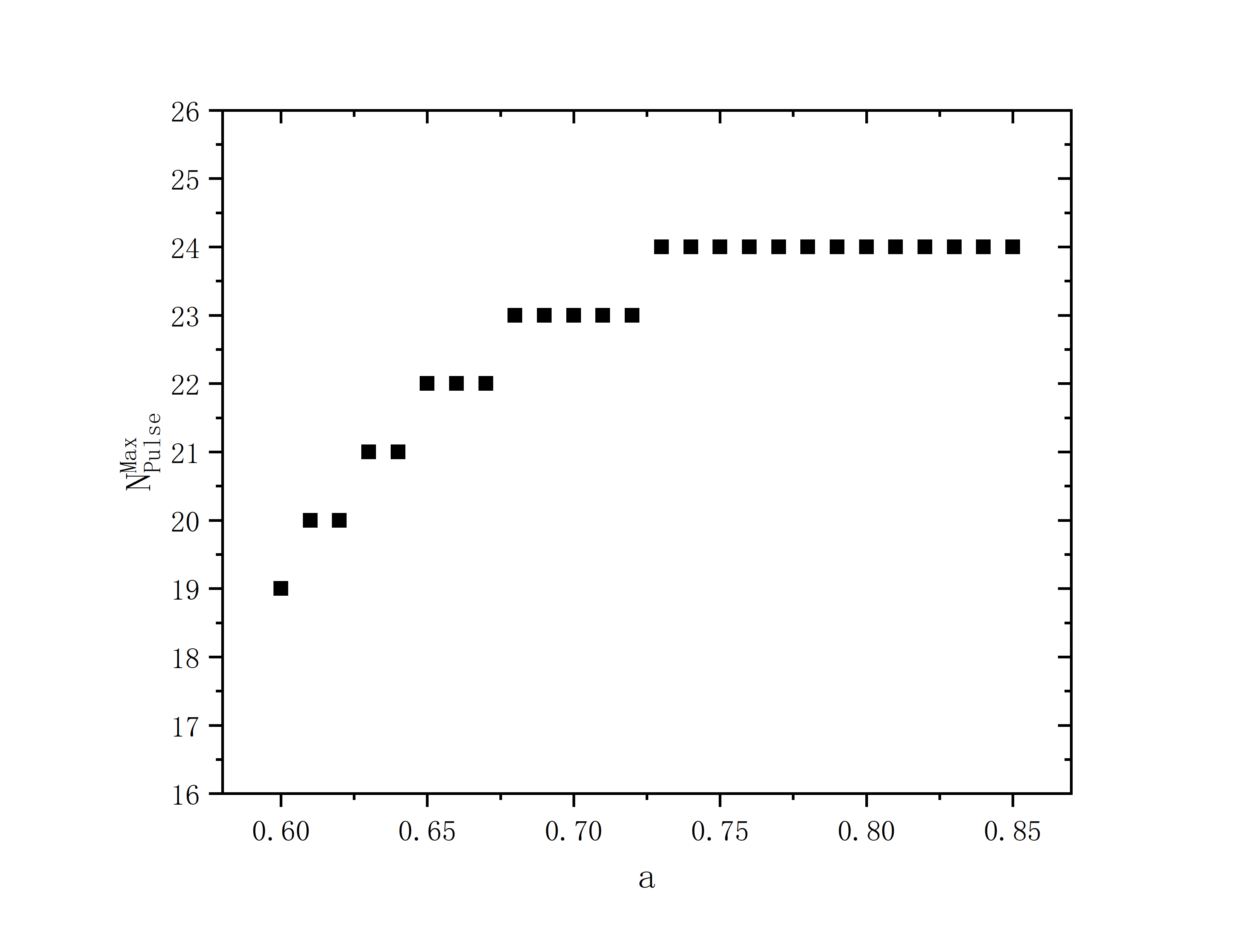
module BOM
implicit none
integer,parameter :: L=500
integer,allocatable :: ring_matrix(:,:)
real,parameter :: h=0.02,PI=3.1415926
contains
subroutine fnf(a,MaxT,number)
implicit none
integer :: i,j,t,N_pulse=0,count_number=0,MaxT,number
real :: epsilon=0.04,a,b=0.07,D=1.0,A1=2.5,f=4.5,effect,u(L),v(L),fun_u(L),fun_v(L),delta,stepT,&
U_change(1:MaxT),T_spike=0.0,T_interval=0.0
logical :: status
status=.true.
u=0.0
v=0.0
do t=1,MaxT,1
do i=1,L,1
stepT=h*t
effect=0.0
do j=1,L,1
effect=effect+ring_matrix(i,j)*(u(j)-u(i))
end do
if(i==1) then
delta=1.0
else
delta=0.0
end if
if(i==1.and.status) then
fun_u(i)=u(i)+h*(1.0/epsilon*(u(i)*(1.0-u(i))*(u(i)-(v(i)+b)/a))+A1*sin(2.0*PI*f*stepT))
else
fun_u(i)=u(i)+h*(1.0/epsilon*(u(i)*(1.0-u(i))*(u(i)-(v(i)+b)/a))+delta*A1*sin(2.0*PI*f*stepT)+D*effect)
end if
if(u(i)<1.0/3.0) then
fun_v(i)=v(i)+h*(-v(i))
else if(u(i)>=1.0/3.0.and.u(i)<=1.0) then
fun_v(i)=v(i)+h*(1.0-6.75*u(i)*(u(i)-1.0)**2-v(i))
else if(u(i)>1.0) then
fun_v(i)=v(i)+h*(1.0-v(i))
end if
if(i==1) then
U_change(t)=fun_u(i)
if(U_change(t)>0.5) then
count_number=count_number+1
else if(count_number>30.and.U_change(t)<0.2) then
N_pulse=N_pulse+1
if(N_pulse==14) then
T_spike=stepT/13.0
T_interval=MaxT*0.02-stepT
status=.false.
end if
count_number=0
end if
end if
end do
u=fun_u
v=fun_v
end do
write(20,*) a,T_spike,T_interval,N_pulse
N_pulse=0
return
end subroutine fnf
subroutine ring(node_number)
implicit none
integer :: node_number,a
allocate(ring_matrix(node_number,node_number))
ring_matrix=0
do a=2,node_number,1
ring_matrix(a,a-1)=1
end do
ring_matrix(1,node_number)=1
end subroutine ring
end module BOM
program main
use BOM
implicit none
integer :: i
real :: a
real(kind=4) :: T_Link_Array(26)=(/195.659988,194.339996,193.080002,191.940002,190.839996,189.860001,188.839996,&
187.919998,187.019989,186.159988,185.319992,184.559998,183.779999,183.059998,182.37999,181.720001,&
181.059998,180.419998,179.87999,179.279999,178.73999,178.179993,177.679993,177.179993,176.660004,176.199997/)
open(20,file="a_Tspike_Tinterval.txt")
open(40,file="data.txt")
call ring(L)
do i=1,26,1
a=0.59+i*0.01
call fnf(a,int(T_Link_Array(i)/0.02),i)
end do
close(20)
deallocate(ring_matrix)
end program main
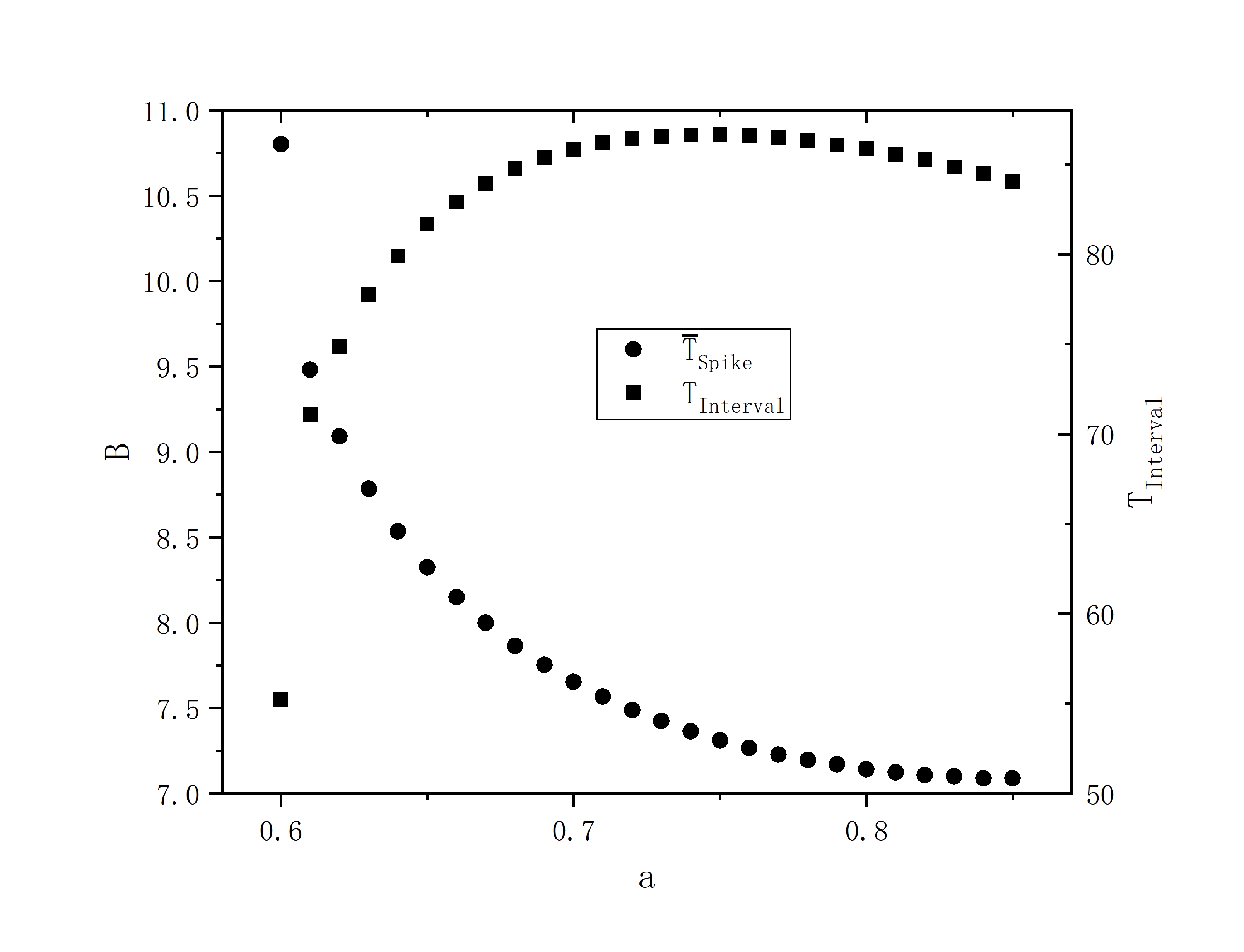
module BOM
implicit none
integer,parameter :: L=500
integer,allocatable :: ring_matrix(:,:)
real,parameter :: h=0.02,PI=3.1415926
contains
subroutine fnf(a,MaxT,number)
implicit none
integer :: i,j,t,N_pulse=0,count_number=0,MaxT,number
real :: epsilon=0.04,a,b=0.07,D=1.0,A1=2.5,f=4.5,effect,u(L),v(L),fun_u(L),fun_v(L),delta,stepT,&
U_change(1:MaxT),T_limit
u=0.0
v=0.0
do t=1,MaxT,1
do i=1,L,1
stepT=h*t
effect=0.0
do j=1,L,1
effect=effect+ring_matrix(i,j)*(u(j)-u(i))
end do
if(i==1) then
delta=1.0
else
delta=0.0
end if
if(i==1.and.stepT<=141.5-1.5*number) then
fun_u(i)=u(i)+h*(1.0/epsilon*(u(i)*(1.0-u(i))*(u(i)-(v(i)+b)/a))+A1*sin(2.0*PI*f*stepT))
else
fun_u(i)=u(i)+h*(1.0/epsilon*(u(i)*(1.0-u(i))*(u(i)-(v(i)+b)/a))+delta*A1*sin(2.0*PI*f*stepT)+D*effect)
end if
if(u(i)<1.0/3.0) then
fun_v(i)=v(i)+h*(-v(i))
else if(u(i)>=1.0/3.0.and.u(i)<=1.0) then
fun_v(i)=v(i)+h*(1.0-6.75*u(i)*(u(i)-1.0)**2-v(i))
else if(u(i)>1.0) then
fun_v(i)=v(i)+h*(1.0-v(i))
end if
if(i==2) then
U_change(t)=fun_u(i)
if(U_change(t)>0.5) then
count_number=count_number+1
else if(count_number>30.and.U_change(t)<0.2) then
N_pulse=N_pulse+1
if(N_pulse==14) then
T_limit=MaxT*0.02/14.0
end if
count_number=0
end if
end if
end do
u=fun_u
v=fun_v
end do
write(20,*) a,T_limit
N_pulse=0
return
end subroutine fnf
subroutine ring(node_number)
implicit none
integer :: node_number,a
allocate(ring_matrix(node_number,node_number))
ring_matrix=0
do a=2,node_number,1
ring_matrix(a,a-1)=1
end do
ring_matrix(1,node_number)=1
end subroutine ring
end module BOM
program main
use BOM
implicit none
integer :: i
real :: a
real(kind=4) :: T_Link_Array(26)=(/195.659988,194.339996,193.080002,191.940002,190.839996,189.860001,188.839996,&
187.919998,187.019989,186.159988,185.319992,184.559998,183.779999,183.059998,182.37999,181.720001,&
181.059998,180.419998,179.87999,179.279999,178.73999,178.179993,177.679993,177.179993,176.660004,176.199997/)
open(20,file="a_Tspike_Tinterval.txt")
call ring(L)
do i=1,26,1
a=0.59+i*0.01
call fnf(a,int(T_Link_Array(i)/0.02),i)
end do
close(20)
deallocate(ring_matrix)
end program main
